#the last enemy to be conquered is the narrative
Text
early bai choufei was the funniest character in heroes actually
#he's just a dude wandering around minding his own business while being gay and deeply unimpressed#oh da-baicai what happened to you#the last enemy to be conquered is the narrative#heroes 2022#说英雄谁是英雄#bai choufei#ashton originals
6 notes
·
View notes
Text
Voltaire's Prayer
“I have never made but one prayer to God, a very short one: Oh Lord, make my enemies ridiculous. And God granted it."
-Volaire’s letter to Étienne Noël Damilaville, 16 May 1767
I’m inordinately fond of sex, in the political sense. It’s saved us so often from the worst parts of ourselves.
As far as anti-authoritarian elements of the human experience go, sex is right up there with curiosity and the search for truth- maybe even more so. When a new tyrant comes to town, shutting down the universities and the libraries is only the second thing they try. The first thing is to regulate human sexuality to within an inch of its life. Rules for marriage, rules for courtship, rules for which genitals may touch and where they may touch and when they may touch. Rules for who and rules for whom. Rules for which kinds of sex must doom characters in literature, rules for which things may be described as sexy, rules for which things may be described in a sexy way.
Of course they do! If you’re trying to bind a large polity together under a common ideological narrative, to render people predictable enough to quash dissent and legible enough to exert power through them, the last thing you need is a bunch of folks running around being horny about stuff without permission. Nature gifted us with a great capacity for reason and community; we have the innate opportunity to learn about ourselves and our neighbors, and to form complex societies based on that understanding. It was Aristotle who first called us the political animal, and the fruits of that extraordinary capacity will always be within our reach, if only we can come together within a shared understanding. The invention of the city is the great triumph of our species, and with it we conquer the universe.
But also this extraordinary, reasoning mind has been sculpted from the raw clay of a biology that’s anchored in sexual reproduction, and this ends up being very, very funny.
The problem isn’t so much that the sex instinct exists, per se. It’s how it’s implemented. Like most biological forms, the full complement of 86 billion(!) neurons in your brain aren’t encoded in a particular configuration; the brain is much too complex to be described so precisely in the only ~725 megabytes or so of human DNA. The particular shape of your brain is in there somewhere- the lobes and subregions responsible for vision, memory, cognition, all that- but only up to a point. The genius and fundamental limitation of genetics is that, below a certain level, the genes instead describe a process for the production and reproduction of specialized cells, and simply constructs them in such a way that they can be relied upon to order themselves as they go.
This is all well and good when we’re talking about kidneys and livers, but the fact that you can encode any kind of specific behavioral instinct in a brain this way is nothing short of a minor miracle. Think about it! Spiders don’t have a ‘spider web’ gene, the gene is for ‘proteins that come together in self-assembling electrochemically sensitive gelatin tissue which, when complete, encodes patterns that operate organ systems such as legs and spinnerets in such a way as to reliably create silk webs.’ This is absurdly impressive, and also completely insane.
What I’m getting at is, powerful behavioral instincts in a complex animal aren’t precise instruction manuals by which we pursue evolutionarily advantageous behaviors. Sex and eros are prior to logic or language, let alone strategy. Sex is a double-thick electrical wire discharging lightning bolts right through the middle of our cognitive centers, installed in the brain by a surgeon wearing mittens. It’s an untethered firehose whipping chaotically through the cathedral, unpredictably spraying golden reliquaries with substances unmentionable. It’s the first and greatest anarchist.
I really can’t overstate my gratitude for this.
Obviously this results in any number of deeply goofy outcomes by way of kinks and odd sexual practices- it gets tangled with pain centers, with random bits of anatomy and proprioception, with our taboos and aversions, with our greatest terrors or our greatest yearnings or just arbitrary stimuli from adolescence, and of course it gets enmeshed so often with our notions of power and submission. It imbues these things with a fascination and potency out of all proportion with their mundane meanings. And ultimately, you end up with human pleasures and human values that diverge so far from banal evolutionary imperatives as to be all but unrecognizable.
Even when this process somehow manages to propagate through the brain in such a way as to drive behaviors that are legibly aligned towards some adaptive constraint- e.g. heterosexual mating practices resulting in biological reproduction and careful childrearing- it’s still madness. Love and sex penetrate deeply across tribal and national and racial boundaries, across economic interests, across battle-lines and enmities. We become traitors, apostates, emigrants, and artists. Declare a law, and in short order some hot-headed young people come along to break it in the name of sexual passions you could not possibly have seen coming. Divide your neighborhood into us and them, and by the time the ink is dry on your proclamation there will be a forbidden relationship across the fence. There is no social order, no ethical system, no theory of human nature that can entirely withstand contact with the full spectrum of human sexuality, because sex and eros are always going to be exactly as bonkers as the complexity of the human mind and culture will allow, plus a little extra just to be sure.
This isn’t always a delight, of course. Many prohibitions exist for a very good reason, and the chaos of human sexuality makes no exemptions for true evil. Some of us end up really, truly victims of this process. But for all the dangers, the chaos at the root of all this isn’t oriented towards evil. Chaos just means chaos, essentially arbitrary and hence absurd in character.
And in the grand analysis, we are so lucky to have this thing moving through our communities, this ridiculous madness that guarantees that there will be cracks in every wall and slips exploding cigars in the pockets of the powerful few. Not in everybody as individuals, of course, and not everybody the same amount; asexuality is certainly one of the outcomes that all this mad gallivanting through our brains can produce. Sexuality would never be so predictable as to guarantee its own existence, after all. That’s part of what makes the joke so funny.
But all of us, regardless of sexuality, get to live in a world where the grand anarchy of sex is constantly driving home this lesson that no category is inviolate and no law is perfect. That we should not and cannot take ourselves too seriously, or forget that we’re animals. That we don’t exist only for the sake of others, or within their understanding. That cities are made of cooperation, grace, and forbearance- not conformity or mere compliance.
People sometimes worry about immortality. In the political sense, I mean. They worry about eternal dictatorships and unconquerable gerontocracies. This fear isn’t entirely unjustified; death has often played a role in progress and liberation. But as long as enough of us are still getting horny without permission, still falling in love in stupid ways, I think we’ll be okay. Romeo and Juliet don’t have to die at the end to make a difference in the world, as long as they’re brave enough to get weird with it.
647 notes
·
View notes
Text
From Zutara to Sokkla - Narrative Framing and Hypocrisy
Something that boggles me about the fandom is the complete double standard between Zuko and Sokka vs Katara and Azula.
A pretty noticeable example is how we frame the infamous “I’ll save you from the pirates” scene versus the Day of Black Sun.
The infamous pirates scene is often lauded (or condemned) as the birth of Zutara. Fans allege the tension between Zuko and Katara is palpable, and that their attraction is clear.
But let’s consider:
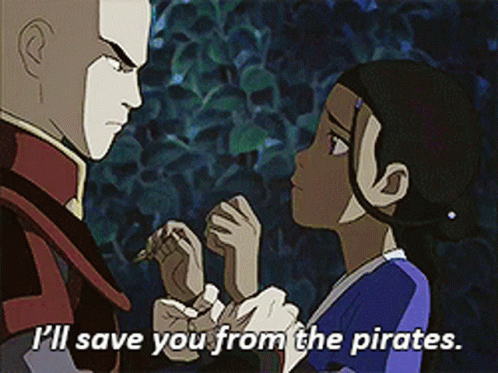
Katara isn’t a realized bender yet. She can’t defend herself. She’s surrounded by hardened adult criminals with weapons who have it out for her, and two firebenders (like the man who killed her mother!) who have been pursuing her doggedly, one of whom has shown he is quick to use violence even against civilians and the elderly.
Zuko dangles Katara’s necklace in front of her, the only item she has left of her mother, and threatens to take it away forever if she doesn’t sell out her friends.
If you want to read romance in this harrowing scene, feel free. It’s fiction and I’m not the morality police. Have fun!
What bothers me is the hypocrisy in how people frame this scene by comparison:

Consider this: Azula can’t bend. She’s unarmed. She’s pinned to the wall and has no means of escape. Her enemy is armed, is the architect of this invasion, has an army outside ready to follow him, and is currently flanked by an unstoppable earthbender and the friggin Avatar!
Azula is using herself as bait to protect her father (and ostensibly Zuko) knowing her life would be in terrible danger for minimum of 8 minutes. During which the enemy can do anything to her. The Fire Nation has done a lot of harm and there are surely many soldiers out there who would love to take their revenge on the Fire Nation’s pretty little princess who conquered the “impenetrable” capital of the Earth Kingdom.
The show goes out of its way to inform us that Azula is an expert at hiding her emotions. She can even fool Toph’s lie detector. Why?
Many people misinterpret this as a sign that Azula is an emotionless sociopath or whatever ableist pop-sci ideas they have about ASPD.
In reality, it’s the opposite. Azula being an expert at hiding her feelings is made clear so that we understand why she doesn’t look terrified, or vulnerable, or sad, or hurt until the finale when she finally cracks and her facade slips.
All she has at her disposal to protect herself is her wits (she had a knife and some Dai Li, but she has neither by this point). She smartly uses what she knows about Sokka to exploit his weakness and buy herself time. She’s so good at getting under his skin (which takes a sophisticated level of weaponized empathy) that even after he figures out what she’s doing, Sokka still can’t help himself.
This is all she can do to protect herself and her father. We as the audience know that Sokka and Toph aren’t going to kill or maim her, but Azula doesn’t!
So why in the world was this scene received as traumatic for Sokka?
Fans will claim that Azula’s mind games in this scene left Sokka with lasting trauma. That this is emotional abuse.
But who is the one pinned to the wall with no way to defend herself? Who is the one with weapons to threaten her with, and powerful allies who have it out for her?
If Sokka experienced any lasting trauma from this altercation, he sure never showed it! Sokka never seems to think much about Azula at all outside of wanting a rematch when it’s presented at the Boiling Rock. And even that is due to his feelings of inadequacy after the invasion. He even makes fun of Suki for being captured by Azula! Doubt he would do that if she had genuinely been tortured or if Sokka had been so traumatized by this scene.

Suki: Are you trying to get on my bad side?
Meanwhile, Katara does seem to have lasting trauma over her repeated altercations with Zuko. She talks about how he chased them all around the world threatening them. She refuses to trust him after he betrays her and fears he will get Aang killed. Zuko did hire an assassin.
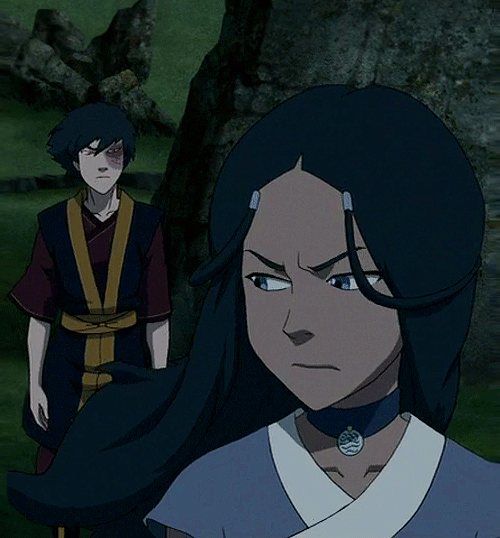
In what universe can we read Zuko and the pirates threatening a helpless Katara as “romantic” but the scene with Sokka and Toph threatening a helpless Azula as “traumatic for Sokka”?
Only a universe where we have already subconsciously decided we are on Zuko and Sokka’s side.
These scenes can only be read that way if we have already decided Zuko isn’t that bad regardless of how Katara feels about what he does to her, and that Azula is pure evil regardless of what anyone does to her.
It’s a world where both Azula and Katara’s feelings are ignored.
If you want to read the pirate scene as romantic? Have fun. Enjoy your fics. It’s all good.
But let’s not pretend Zuko is some pure woobie in this scene that just needs some Katara loving, while Azula is some fearless psychopathic monster that enjoys putting herself in danger as long as she gets to “abuse” Sokka.
There’s a reason these two scenes exist this way. Katara and Zuko are parallels just as Azula and Sokka are. Katara and Azula are foils just like Sokka and Zuko are.
Fandom can and should do better by Katara and Azula. They deserve just as much consideration and empathy for their suffering and unmet needs as their brothers do. Even if Azula was a villain - so was Zuko for most of the show!
And as a pretty consequence, I can say this: Zutara and Sokkla are equally viable.
Goodnight, shippers.
323 notes
·
View notes
Text
Dragon Ball (1986)ドラゴンボール























Director: Daisuke Nishio
Screenwriter: Akira Toriyama
Starring: Masako Nozawa / Nori Yanami / Tsuruhiro Mi
Genre: Comedy / Animation / Fantasy / Adventure
Official site: en.dragon-ball-official.com
Country/Region of Production: Japan
Language: Japanese
Date: 1986-02-26 (Japan) / April 26, 1989 / February 7, 1996 / April 5, 2009 / July 5, 2015
Number of Seasons: 6
Number of episodes: 806
Episode length: 25 minutes
Number of Movies: 29
Number of Games: 111
Also known as: Dragonball / Dragon Ball Z / Dragon Ball GT / Dragon Ball Z Kai / Dragon Ball Super
IMDb: tt0088509
Type: Reimanging / Appropriation
Summary:
Earth, known as the Dragon World (ドラゴンワールド) and designated as "Planet 4032-877" by the celestial hierarchy, is the main setting for the entire Dragon Ball series, as well as related media such as Dr. Slump, Neko Majin, and Jaco the Galactic Patrolman. It is mainly inhabited by Earthlings (地球人, Chikyūjin), a term used inclusively to refer to all of the intelligent races native to the planet, including humans, anthropomorphic beings, and monsters. Starting from the Dragon Ball Z series, various extraterrestrial species such as the Saiyans (サイヤ人, Saiya-jin) and Namekians (ナメック星人, Namekku-seijin) have played a more prominent role in franchise media.
The narrative of Dragon Ball predominantly follows the adventures of the Saiyan Son Goku; upon meeting Bulma at the beginning of the series, the two embark on an adventure to gather the seven Dragon Balls, a set of orbs that summon the wish-granting dragon Shenlong. Goku later receives martial arts training from Kame-Sen'nin, meets his lifelong friend Kuririn, and enters the Tenkaichi Budōkai (天下一武道会, lit. "Strongest Under the Heavens Martial Arts Tournament") to fight the world's strongest warriors. When Piccolo Daimao, and later his offspring Piccolo, tries to conquer the planet, Goku receives training from Earth's deities to defeat them. Goku later sacrifices his life to save the planet from his estranged brother Raditz, but is revived after training in the afterlife under the tutelage of the North Kaio to combat the other incoming Saiyans, Nappa and Vegeta. He later becomes a Super Saiyan and defeats the powerful alien tyrant Freeza; this sets the tone of the rest of the series, with each enemy the characters face becoming stronger than the last, requiring them to attain further training.
Dragon Ball Super establishes that the franchise is set in a multiverse composed of twelve numbered universes, with the majority of the Dragon Ball series taking place in Universe 7 (第7宇宙, Dai-Nana Uchū, lit. "Number Seven Universe"). Each universe is ruled by a number of benevolent and malevolent deities, respectively called Kaioshin and Gods of Destruction who are appointed by a higher being called Zeno, who watches over the multiverse.
Source: https://en.wikipedia.org/wiki/Dragon_Ball
Link: https://www.crunchyroll.com/series/G8DHV7W21/dragon-ball
#Dragon Ball#ドラゴンボール#Dragonball#Dragon Ball Z#Dragon Ball GT#Dragon Ball Z Kai#Dragon Ball Super#dbz#db#dbz goku#jttw media#jttw televison#jttw movie#jttw game#movie#television#game#animation#reimaging#reimagining#alternative universe#appropriation#son goku#sun wukong#zhu bajie#sha wujing#tang sanzang#erlang shen#li nezha#princess iron fan
19 notes
·
View notes
Note
people can accept that robb was doomed by the narrative but not dany? is she better than him? why?
If you imagine a writer sitting down at his desk, you can see how he’d come up with the trajectory of Robb’s story. It’s a clean tragedy, it shocks us, it hurts, but it also rings off that tragic romanticism that the series is full of. However, it is hard to imagine Martin sitting writing about a man raping a 13yo until she wanted to die with the thought that yeah, she will ultimately die betrayed, unloved, murdered, a few books later.
If Dany were to sacrifice herself and die, I think most fans would accept it because we have a kind of reverence for tragic stories—they’re widely considered more intellectual, a higher form of art, and there is a deep strain of melancholy in the story that you can situate such an ending in. Now, you and I would cry foul, we want justice for Dany taking part in the slave trade, for her allowing the murder of teenagers, for her upcoming invasion and the devastation that will bring and the burning of KL etc. A lot has/will happen that explains how Dany will arrive at her end, but many Dany fans are women and they simply aren’t gonna go along with an abuse survivor/rape survivor -> villain -> dying at the hands of the heroes pipeline. It’s so antithetical to their sensibilities. I’ve even seen Dark Dany fans say they’re uncomfortable with how Martin has written Dany’s life knowing where he’s taking her and that perhaps such a story shouldn’t be written by a man, so it isn’t only hardcore Dany fans who take issue with this choice.
And of course, s8 handled everything including Dark Dany so poorly, had her nephew/lover kill her, so the topic is toxic, and I routinely see people saying X can’t happen in the books even though it’s one of the few things that has been confirmed to come from Martin (Poor Shireen, King Bran…), I assume because the show so effectively poisoned the well. Anyway, now people say, "well that's just D&D fanfic" as a way to not consider Dark Dany/her fate.
Actually, I suppose that's the real issue. Stannis burning Shireen means you have to reconsider what you thought about him, what you understood the story to be, and Dany going up against the heroes and dying their enemy, that too means you have to rethink things--it upends everything. After his death, Robb remains a hero, even if he made some poor choices, so you don't have to ask yourself,
"wait, why didn't I think burning people alive was a red flag? Why was I cool with making money from the slave trade? Why did I think it was okay to conquer a continent Dany's family had already been rejected by?"
When someone (Kit? D&D? I can't remember now!), said that the audience had been cheering Dany on and that it was kinda, damning that they had, I was incredibly annoyed because GoT took out some of the red flags and then rewrote main characters to hide Dark Dany until the last minute, but ASOIAF hasn't done that. We're pointed to these issues by characters in the text, asked to weigh these things, so that's another issue, it requires some self-reflection.
That, I suppose, as well as the fact that being in her head, walking the journey with her in a way we didn’t with Robb, just makes the idea untenable to most.
86 notes
·
View notes
Text
Something really wonderful about Eowyn and how she is written is that even though she is a woman, and driven to extreme emotional lengths, at no point is she depicted as an "hysterical woman" by the narrative. If anything, when Eowyn is allowed to speak, she can be brutally logical.
In her argument with Aragorn, Aragorn presents what is a generally good point, but Eowyn absolutely rips it to shreds by pointing out what his hypothetical point means for her (and other women) in reality.
‘A time may come soon.’ said he, ‘when none will return. Then there will be need of valour without renown, for none shall remember the deeds that are done in the last defence of your homes. Yet the deeds will not be less valiant because they are unpraised.’
And she answered: ‘All your words are but to say: you are a woman, and your part is in the house. But when the men have died in battle and honor, you have leave to be burned in the house, for the men will need it no more. But I am of the House of Eorl and not a serving-woman. I can ride and wield blade, and I do not fear either pain or death.’
Aragorn cannot dispute that. Whether he agrees or not, he cannot find fault in her reasoning. He has to change tack by addressing emotions.
‘What do you fear, lady?’ he asked.
‘A cage,’ she said. ‘To stay behind bars, until use and old age accept them, and all chance of doing great deeds is gone beyond recall or desire.’
Now Aragorn tries to use logic again.
‘And yet you counselled me not to adventure on the road that I have chosen, because it is perilous?’
‘So may one counsel another,’ she said. ‘Yet I do not bid you flee from peril, but to ride to battle where your sword may win renown and victory. I would not see a thing that is high and excellent cast away needlessly.’
‘Nor would I,’ he said. ‘Therefore I say to you, lady: Stay! For you have no errand to the South.’
‘Neither have those others who go with thee. They go only because they would not be parted from thee — because they love thee.’ Then she turned and vanished into the night.'
He tries to use her own points against her, and she instantly gets back at him, hit for hit. He tries to respond to that with a mix of flattery and general "you just can't, that's why". Even then, Eowyn points out his double standards. For admitting her love, almost, Eowyn has to turn away and leave, yet she is left with the last word.
Even when facing the Nazgul, Eowyn has the last say, using the Nazgul's own words against him.
A cold voice answered: 'Come not between the Nazgûl and his prey! Or he will not slay thee in thy turn. He will bear thee away to the houses of lamentation, beyond all darkness, where thy flesh shall be devoured, and thy shrivelled mind be left naked to the Lidless Eye.'
A sword rang as it was drawn. 'Do what you will; but I will hinder it, if I may.'
'Hinder me? Thou fool. No living man may hinder me!'
Then Merry heard of all sounds in that hour the strangest. It seemed that Dernhelm laughed.... 'But no living man am I! You look upon a woman. Éowyn I am, Éomund's daughter. You stand between me and my lord and kin. Begone, if you be not deathless! For living or dark undead, I will smite you, if you touch him.'
Eowyn is staring downt he fucking Witch King, and is Rules Lawyering him. The Nazgul throws fear at Eowyn, and Eowyn throws reason back. To devastating effect.
'The winged creature screamed at her, but the Ringwraith made no answer, and was silent, as if in sudden doubt. Very amazement for a moment conquered Merry's fear. He opened his eyes and the blackness was lifted from them.'
That bit of wordplay strikes doubt into the heart of her enemy, and courage into the heart of her ally, who is able to provide her pivotal assistance in her victory.
Again, when Eowyn debates with the Warden, he makes a good general point about wishing for peace over war, and wished people would heal instead of kill, and Eowyn points out why this ideal just doesn't work in reality.
'But for long years we healers have only sought to patch the rents made by the men of swords. Though we should still have enough to do without them: the world is full enough of hurts and mischances without wars to multiply them.'
'It needs but one foe to breed a war, not two, Master Warden,' answered Éowyn. 'And those who have not swords can still die upon them. Would you have the folk of Gondor gather you herbs only, when the Dark Lord gathers armies? And it is not always good to be healed in body. Nor is it always evil to die in battle, even in bitter pain. Were I permitted, in this dark hour I would choose the latter.'
Eowyn points out that as much as the Warden would wish there was no war, when a war is started against you, it must be fought against.
Eowyn's more tragic declaration that she would rather die in battle than live to be healed also doesn't strike me as "hysterical", but a response that is logic, that isn't tempered by faith or hope. She knows in all likelihood death is upon them, the chances of victory are slim, and for that reason, she would rather die in battle, than be healed, only to be slaughtered when the enemy comes.
It almost puts me in mind of the of the opening to The Haunting Of Hill House. "No live organism can continue for long to exist sanely under conditions of absolute reality; even larks and katydids are supposed, by some, to dream. Hill House, not sane, stood by itself against its hills, holding darkness within; it had stood so for eighty years and might stand for eighty more."
That's Eowyn. Living alone, in darkness, her dreams denied her, forced to live under the reality that victory is improbable, and all that is awaiting her is death.
When she meets with Faramir, she responds to his use of logic, helped along by the fact that he doesn't question her wishes, but instead advises her how best to achieve her ends.
'But I do not desire healing,' she said. 'I wish to ride to war like my brother Éomer, or better like Théoden the king, for he died and has both honour and peace.'
'It is too late, lady, to follow the Captains, even if you had the strength,' said Faramir. 'But death in battle may come to us all yet, willing or unwilling. You will be better prepared to face it in your own manner, if while there is still time you do as the Healer commanded. You and I, we must endure with patience the hours of waiting.'
He acknowledges that Eowyn's wish to die is a wish to die on her own terms, instead of being slaughtered, and doesn't dismiss her as irrational or hysterical. He sees the truth of the matter, and the advice he gives her is advice on how best to do what she wishes.
He also acknowledges they are in the same situation, talking about themselves as "we", assuring her he's on her side, and is not in opposition to her. He's not framed as a rational man schooling the irrational woman, but as a fellow at arms who sees himself in her situation and is sharing advice, one comrade to another.
That respect, that understanding, is enough to move Eowyn to tears, and she shows Faramir some vulnerability. She can do so, because someone is treating her as a reasonable being, and is actually listening to what she has to say.
We also see that Eowyn can put her rational, logical thinking into practise. We only have a glimpse of her taking charge of Dunharrow, but it's clear she has everything well arranged, despite the high pressure situation, where she is dealing with both the people's practical and emotional struggles.
“All is well. It was a weary road for the people to take, torn suddenly from their homes. There were hard words, for it is long since war has driven us from the green fields; but there have been no evil deeds. All is now ordered, as you see. And your lodging is prepared for you; for I have had full tidings of you and knew the hour of your coming.”
She gives a concise update on the situation, on the struggles they endured, a logical and empathetic reasoning for those struggles, and shows that everything has been sorted in the end, with no major issues at hand.
And there's no condescending suggestion that when Eowyn is right, or accomplishes something or is aware of something, that it is because of her "woman's intuition" or "natural woman's empathy", which sounds flattering at first, but in practise only acts to deny women their ability to use reason (like "men do") while still explaining why they might still have any insight. No, Eowyn is able to look at the situation around her, and draw logical conclusions.
The refutation of Eowyn's suffering being only that of an "emotional" or "hysterical" woman without an outward source comes most clearly when Gandalf explains to Eomer that Eowyn's suffering doesn't come from her thwarted love for Aragorn, nor does it stem from a vague, unknown emotional font from within, but as an entirely justified and reasonable response to the situation she was in.
'My friend, you had horses, and deed of arms, and the free fields; but she, being born in the body of a maid, had a spirit and courage at least the match of yours. Yet she was doomed to wait upon an old man, whom she loved as a father, and watch him falling into a mean dishonoured dotage; and her part seemed to her more ignoble than that of the staff he leaned on.'
Women being inherently "emotional" has often been used to explain why a woman might be suffering, might be angry or frustrated or resentful, without having to assign fault or responsibility to anyone or anything but herself.
It is never her circumstances or the actions of the people around her that has elicited this emotional response, but her very womanhood. And therefore, her troubles can be overlooked or dismissed, and those around her can continue to act as they will, without guilt or blame.
Here, Gandalf and the narrative absolutely smash that insinuation, by rightly pinning the main cause of Eowyn's suffering on the terrible circumstances she was in.
Eowyn is allowed to be at once emotional and logical. Her extreme emotions are allowed to have a logical reason behind them, and she is at her best when logic and emotion are united. In leading the people to Dunharrow, she shows both reason and compassion. In standing before the Nazgul, she uses both her devotion to her uncle, and a nifty bit of wordplay against the Witch King. When she meets Faramir, she is able to open her heart, because he shows his respect to her as a rational being right from the first.
24 notes
·
View notes
Text
Okay, this is probably just me being Very Silly but… I think Roleswap AUs are a lot of fun, not just like… as a character design exercise thingy, but as a character exploration and analysis exercise… thingy.
Like, you know, it’s a game of ‘what would this character do if they were in that situation that this other character was in?’, ‘how much would change if those were the circumstances of this character’s life?’, ‘how much do you have to change about a character to make them work in this specific narrative role - and how much you just cannot change without making the character unrecognizable?’
So I’ve had a lot of fun playing around with my Adventure Time Roleswap AUs (you can get a better look at them with the AT Roleswap Tag on my blog).
And I’ve been thinking if I could do a similar thing for Invader Zim - both because IZ has these clear Four Leads that you can swap around very neatly (actually much more than AT does lol) and… mostly because I’ve been going through yet another of my Literally Can’t Think of Anything but Invader Zim Phases and Roleswap AUs offer an exciting new opportunity to Rotate These Characters in My Head.
(For the sake of clarity, I’ll be using ‘the Alien’, ‘the Kid’, ‘the Robot’ and ‘the Sibling’ when referring to the Narrative Roles of Zim, Dib, GIR and Gaz respectively. So if I’m talking about a Dib-Zim Roleswap I’ll be talking about Zim-as-the-Kid and Dib-as-the-Alien. It might lead to weird turns-of-phrase later down the line, like Sibling!Dib when Dib is obviously always a sibling - but at least I hope it’ll be less clunky and more clear that way lol)
So, yeah, I had some Thoughts and Considerations about the idea of a Zim-Dib GIR-Gaz Roleswap, but all-in-all things fall into place pretty easily. Playing on Dib’s relatively-more-heroic role and his only-sane-man shtick by having him as a kinda Irken Rebel - he might still have the interest in magic and supernatural things that Mainstream Irken Science does not acknowledge, but mostly he’s seeing as ‘crazy’ for such ridiculous concepts as ‘conquering the galaxy just for the sake of it is Bad Actually’ and ‘maybe it’s kinda stupid to pick our leaders based entirely on how tall they are’ and ‘the Tallest are obviously blatantly figureheads and the Control Brains are running the show’.
And to add insult to injury, it’s not just that his fellow Irkens don’t listen to his ideas - it’s that they don’t even have enough respect to treat him as an actual dangerous enemy of the state. Instead he’s seen as a crackpot and a joke. He’s basically constantly avoiding the obvious Existence Evaluation he deserves because the Tallests keep procrastinating it and pushing it back in favor of more ‘important things’. And, like, it’s not like Dib wants to be executed by the state for the crime of free thought… but it’ll be nice to know that he’s seen as a real threat.
And of course while he’s better than most Irkens at the whole ‘Space Imperialism is Bad Actually’ thing, he still hasn’t unlearned all of the Irken propaganda about their own superiority (he’s got a Green Savior Complex basically) … and also he's got his own complex about his own superiority. Like, yeah, he’s infuriated by his people’s obsession with height because it’s a stupid illogical prejudice… but also specifically because it makes people disrespect him. When his two lazy and stupid smeethood bullies were made supreme leaders of the empire that was kinda the last straw for him.
Oh, in this AU the Tallests are basically the Same except their colors are switched. So now Red is the sillier and dumber one and Purple is the relatively more competent one. And on one hand Dib is the only Irken who seems to understand how thoroughly unfit to rule these two clowns are but he is also kinda obsessed with making them acknowledge his superiority even though he knows their opinion shouldn’t matter and thus making him the biggest clown of them all, in a way.
I’m still ironing out the details of how he gets to Earth. Something about using his hacking skills to infiltrate Operation Impending Doom 2 to try and sabotage it from within. Then, like, maybe the Earth ‘assignment’ was a trap laid by the Control Brains to get him out of the way. Or maybe he picked Earth because although the Empire sees it as unimportant - Dib thinks it has powerful arcane significance that makes it the perfect foundation for his resistance against the Empire or something like that.
I’m mostly thinking which of these is the snappiest and easiest to explain, but I do enjoy the idea of it being a trap cause it creates the possibility of a “the Alien discovers their plan is a big fat lie” scenario like in ETF, but rather than being utterly despondent and depressed like Canon Zim - Alien!Dib will be joyous and jubilantly validated at the idea that he was considered a notable enough threat to get out of the way with such an elaborate trick.
And Zim as the son of Professor Membrane is also a fun concept to consider. It’s very funny to think of him as still a megalomaniac trying to take over the world while also being just a human kid. He wants to defeat Dib because he sees him as a threat for his world domination plans (maybe not even understanding that Dib is not actually a world-conquering rival) and cause he believes that if he exposes or kills Dib he can get his hands on the advanced alien tech, which is the edge he needs in order to take over the world.
You can justify his world-conquering-obsession as, like, him growing up under the pressure of living up to his father’s legacy and he figured the only way to escape Membrane’s shadow is to go totally against everything he stands for, or that he’s subconsciously seeking revenge against the world and humanity for taking away his father's love and attention, or that he’s hoping that if he becomes an Actual Threat to the world, his dad will have to pay attention to him for a change ,or maybe it’s just ‘Zim is Just Weird Like That’. Or probably some combination of all of the above.
GIR and Gaz slot pretty effortlessly into their new roles. Sibling!GIR could be literally Zim’s little brother, or like, some genetically engineered dog monster Professor Membrane made in an afternoon. But personality-wise there’s no need to change much outside of maybe needing to tone a human version of GIR down just a tad because a human child has some biological, legal and physical limitations that GIR would otherwise lack.
Robot Gaz is basically like ‘Dib stole and reprogrammed a SIR Unit to have Free Will, still somehow struggles with the idea that Free Will means she can disobey him as well’. Pretty much as soon as they landed on Earth she acclimated better than Dib did and developed a fondness for Earth’s junk food and video games. She generally does her own thing and doesn’t really listen to Dib’s schemes to develop Earth’s defenses or harness some sort of supernatural forces against the Irken Empire or foil Zim’s plans or whatever - but mostly because disagrees with Dib’s methods and attitude rather than his goals.
She does prefer the Earth over the Irken Empire and she does have some affection for Dib despite also finding him so annoying. She just refuses to cooperate with plans she thinks are frivolous or stupid or plainly just for Dib’s ego. When push really comes to shove, when she actually believes Dib and/or the Earth is in danger, she would come to help… usually.
So yeah, that Roleswap works pretty smoothly, but the problem starts if I try to do the two other sides of this Roleswap cube. the 'Invader GIR' and 'Invader Gaz' scenarios. This is where I get stuck... And the thing isn’t that the characters aren’t complex and versatile enough - I actually think the IZ characters are pretty multidimensional in their ridiculousness.
It’s just that Dib and Zim’s psychology are really designed for them to play the roles of Protagonist and Antagonist - they’re very much defined to their very core by how driven and motivated they are and how much they want to take center stage. Zim's so self-obsessed he pretty much has to take over any narrative you place him in. And like 50% of Dib’s psyche can be summarized as a terminal case of Main Character Syndrome. Meanwhile, while GIR and Gaz have their own motivations - but GIR’s are generally too wild, capricious and frivolous to actually motivate a Plot, while Gaz’s very much defined by how mundane all of her motivations are. So you really have to work extra hard to make sure Zim and Dib, even when relegated to the sidekick role, don’t still find a way to steal the show.
Honestly, doing Zim as the Robot is actually something I think I can make work. If you just play up a few of Zim’s wackier elements - and especially his blind obedience and dedication to his superiors (which in this case would be Alien GIR), I think you can get a version of Zim that is recognizably Zim while still sticking mainly to the Wacky Comic Relief role.
(And for the record, Robot Zim is a modified SIM Unit, which is a Standard Issue Minion. What does the Z stand for? The Z stands for ZIIIIIIIIIIIIIIM, obviously!)
Sibling Dib was kind of a weird journey for me because at first I thought I had an easy solution for it - just Bill-fy Dib! Keep all of Dib’s bolster and UFO obsession stuff, but minus the fact that he can actually recognize an alien standing in front of his face. Probably because he just doesn’t want to admit his sister found an alien before he did - he just refuses to believe GIR is an alien and going off his wild-goose chases against his own phony conspiracy theories.
But… I think that idea is, like, too effective at keeping Dib away from the limelight? I mean, that would basically relegate him exclusively to Comic Relief and someone Gaz could have conversations with and very little plot relevancy. And I think we should be able to do better by Sibling Dib. Some way to keep him away from the Main Character Role, but still have him as a relevant and useful character from time-to-time?
Putting GIR in any sort of lead role is the much bigger problem. Like I said - GIR just too deranged and too uncontrollable to hold most plotlines, even on Invader Zim. And I can imagine grounding him just a tad, you can do, like ‘alien Invader comes to earth in order to conquer it - realizes he likes junk food and stupid TV so much that he doesn’t want to do it anymore, but still lacks any real concerns for human life or morality’. You know, I’m imagining wacky misadventures that are basically in the spirit of ‘what if SpongeBob SquarePants lacked any sense of right and wrong’ - and that will be a viable narrative, but I’m worried it’s getting too far away from the sheer id-like essence of GIR.
On the Kid corner, obviously you can make narratives in which Gaz and her motivations move the story along - Invader Zim Canon did it multiple times. It’s more of a question of how much we can keep this up. Like, okay, this is purely me and my stupid personal hang-ups. But what I’m looking for is an AU that really feels like it could be its own standalone show, and obviously it’s not going to be the same as Canon IZ - like the Invader Dib roleswap is going to have a slightly more standard heroic narrative compared to the total Villain Protagonist setup of the canon - but I want to make sure everyone fulfill their new Narrative Roles to the level you can imagine a Variety of Episode Plots that fit the 11-minutes-and-occasional-double-length format of IZ.
And with Gaz being really defined by the fact that she cares more for being left alone or the mundane things in life or enacting terrible revenge in the name of the mundane things in life than for any of the sci-fi shit or saving the world- it kinda limits the amount of plots she should be willing to participate in and/or requires a lot of extra Set-Up to explain why she’s emotionally involved in the plot.
I mean, I can certainly imagine a story about a hedonistic would-be Invader making a bizarre harebrained scheme to get his hands on a ridiculous amount of tacos which somehow spirals into attracting the ire of some scarily competent and spiteful little girl by, like, interrupting her Super Mario Odyssey speedrun or something and so she causally takes down his whole operation. But that sort of setup works better for a sort of hyperformulastic show like ‘Phineas and Ferb’- and ‘Phineas and Ferb’ is lovely, but Invader Zim really benefits from a wide variation of plots and episode structure.
(That’s also the problem with a Tallests-Zim Membrane-Dib roleswap. Although the idea of an P&F style sketch starring the two lazy goofball Invaders who are just trying to get their incredibly obnoxious and megalomaniac boss off their back and are repeatedly accidently foiled by a brilliant hypercompetent child genius who also somehow remains consistently oblivious to the fact that they are aliens trying to take over the world is very Fun and I should probably do something Separate with it later)
And then there’s the idea of a Zim-Gaz GIR-Dib roleswap which is… I don’t even know where to start. That’s pretty much what that one body-switch-themed guest issue of the IZ Comics used basically because it’s the one that breaks the show’s premise the most thoroughly. The show’s most ambitious and least competent character swapped with its least ambitious and most competent and the most grounded character is swapped with the most unhinged. I am still really stuck on how to make it work?
The only real idea I have for now is maybe taking inspiration from Alien Gaz from that aforementioned comic issue’s characterization - not of Gaz-as-Zim, but of Zim-as-Gaz. Something about an Alien Invader who is genuinely invested in conquering the planet but also she keeps getting distracted? It’s hard to really say when, like I said, that’s really the only thing I have right now.
Perhaps I need to think about all of this a bit more, or perhaps the real lesson of this Character Exploration Thingy is just that those kinda roleswaps just don’t work with the Invader Zim cast?
#iz#invader zim#role swap au#swap au#iz au#iz analysis#roleswap#roleswap au#zim#zim iz#iz zim#zim invader zim#invader zim zim#dib membrane#iz dib#dib#dib iz#dib invader zim#invader zim dib#iz dib membrane#gaz#gaz iz#gaz invader zim#gaz membrane#iz gaz#iz gaz membrane#invader zim gaz#gir#gir invader zim#gir iz
29 notes
·
View notes
Text
Early Islamic Expansion- Colonialism or Conquest?
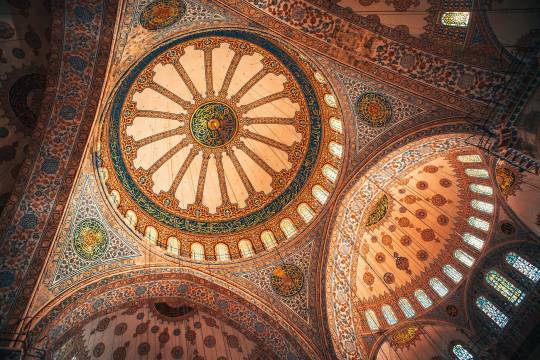
There’s a common narrative among many westerners of how Islam itself in its early days was a coloniser of many peoples and territories. How during its conquests of the 7th and 8th centuries, Islam suppressed the populations and forced upon them a new faith and language, echoing the narrative that its expansionism was strictly conducted by the sword. What was this earth-moving proof that had convinced those who hold this flawed and over-simplified view so deeply?
Firstly, let’s quickly summarise the zeitgeist of the times from a political perspective and then assess what this geographic expansion was and when it all happened. During the life of the Prophet Muhammad, peace be upon him, Western Asia was dominated by two empires that were in a bloody and violent war that had lasted for over eight decades. These two empires were the Byzantine and Sassanian empires. In the Arabian Peninsula, a region that wasn’t included in either’s domain, both intertribal aggression and constant raids were also concurrently rampant. When the fledgling faith became threatened in Medina by its various enemies in the early 7th century, the necessity for defence and thereafter the protection of its believers had to take priority for the Muslim regional minority.
With the Battle of the Trench, the failed attack on Medina by the Quraysh clan and their allies against the Muslims, thus began the eventual conquest of Islam overtaking the entire Arabian Peninsula during the lifetime of the Prophet, peace be upon him, followed by the Rashidun Caliphate. This saw the expansion span from the eastern borders of Persia, Turkey to the north, and Libya to the west. Finally, during the Umayyad Caliphate came the crossing of Islam into Afghanistan and the Indian subcontinent, into the northwestern African lands of the Maghreb, and into the Iberian Peninsula. From 622 to 750 CE, over 120 years, Islam expanded rapidly across three continents.
Now, with this background, we can indulge in the confirmation or repudiation of the element of colonialism in Islam’s conquests. But one more quick digression: let’s define colonialism in simple terms. Colonialism is when one more powerful people invades and occupies another people, usurps their rights and natural resources for the sole purpose of self-interest, like what the British, French, and Spanish empires did to the world from the 15th to the 20th century, as well as what Israel is currently doing in Palestine during the supposedly civilised 20th century.
Beyond the facts, this foundation is how we must establish our conclusions and how we must compare the behaviour of Islam towards those conquered peoples relative to other nations of the time. We can’t expect Islam to behave as per 21st-century standards or even the 20th century. But even we should question that: was Islam actually more humane than even the colonialists of the 20th century?
One would note, when looking at the Islamic expansion and the short duration it took, the accomplishments suggest a speed of success unheard of. It was true that both the Byzantine and Sassanian Empires had fought their way to their eventual collapse over the decades, but still, the number of the Muslims paled in comparison. There are significant factors that played into this dynamic. These empires had shown extreme oppression towards the inhabitants of those occupied regions, while Islam exhibited a tolerance and relatively fair approach to those of other faiths. In general, in most of the conquered nations, the local inhabitants offered no resistance to the invading Muslims as they had little or nothing to lose by the changing of the guard. In some cases, such as in the Levant, Mesopotamia, and Egypt, Islam was a liberator and hence openly welcomed such was the case in the opening of Jerusalem and Jews being allowed to return.
One aspect that differentiated Islamic forces from other preceding victorious armies was that Islam had embedded within its belief system the rules of engagement during warfare, with humanitarian tenets that understood there was to be the protection of women and children and to respect the property and symbols of other faiths. Yes, there were occasions when individuals broke such tenets, but these should be regarded as exceptions.
Was spread by the sword?
This is a narrative originating at the time of the Crusades when the sole ambition was to discredit Islam and give it a barbaric and savage reputation. A common misrepresentation of this narrative was the supposed forced conversions of conquered peoples, whereas the facts suggest that even prior to any imminent military engagement, the Muslim generals would offer the options of conversion to Islam, acceptance of dhimmi status (meaning the payment of an annual jizya tax), or trying their chances at armed conflict. Even upon Muslim victory, the first two options remained available.
The widespread and well-documented dhimmi system that dealt with non-Muslim citizens is proof that no forced conversions took place. There was a structure in place that allowed for religious continuity while also protecting rights with a structure that maintained the retention of physical land and property. Property records show that in the varying lands conquered in the previous Byzantine and Sassanian Empires, Muslims were a small minority during the early Islamic reign, ranging between 10 to 20% of the population up until a century or two after the initial conquest. In certain cases, such as in Iran and Egypt, Muslims as a majority of the population only came into being well into the 9th century. How can that possibly be forced conversion?
Another powerful counterargument for the case against Islamic colonialism is the fact that there was never really any extraction of resources out of the conquered lands and shipped off to Mecca back in Arabia. In actuality, trade and commerce throughout the new Islamic territories blossomed further during Islam’s reign and created a series of powerful cosmopolitan cities across the empire that would eventually become some of the greatest and brightest cities on the planet within the next two centuries: Baghdad, Damascus, Cairo, and Cordoba. Meanwhile, Mecca and Medina, the supposed colonial centres, were humble in their expansion and prosperity for the next millennium and beyond.
A question that can always be asked to further prove this point: would the British ever have moved their capital from London to Delhi?
To exhibit the difference, the capital of the Muslim empire left the Arabian Peninsula with the coming of the Umayyad Caliphate, never to return. Such a decision only reflects that the Islamic empire wasn’t about the benefit of one people, nation, or territory over another, but that a new set of groups of united people, inclusive of those conquered, were now a new nation that had much larger collective aspirations.
One would think that the Islamisation of faith would result in the Arabisation of language, but the reality was the opposite. As the Islamisation of the populations took significant time to materialise, learning the language of the faith, Arabic, was never forced onto others. The fast-paced assimilation of Arabic was principally due to the fact that it was the primary language of trade, governance, and law within the Islamic empires, as well as being a language familiar to the populations of the Levant and Mesopotamia, who were mainly Aramaic speakers.
Arabisation wasn’t about the Muslim faith but was about integrating within a civilisation that was booming not just back in Arabia but everywhere. It became the common language for non-Arabs and non-Muslims to prosper. During the subsequent golden age, thinkers and scholars from across the empire wrote and relayed in Arabic, much in the same way that the English language spread all over the world during the 20th century due to globalisation and technology. Arabic achieved widespread acceptance for the sake of the transfer of knowledge and in aspiring to prosperity.

To learn more about Islam visit: Howtomuslim.org
12 notes
·
View notes
Text
Mechs Ships Tournament: Shipping Round 2 Poll 10
Propaganda:
Cinders/Rose:
cinders song
they mean the world to me. they ended tragically. they had a happy ending. they'll always find a way to each other. they're even gay
Tragic enemies to lovers (Cinders’ planet was conquered by the army rose was part of in Cinders’ lifetime, and Rose was in charge of the prison she was kept in) to lovers and Cinders spent thirty years travelling the galaxy searching for her wife and they’re even lesbians what more do you want
the whole album
#CINDER/ROSE#!!!!!#THEY MEAN THE WORLD#CINDERS SEARCHES THE GALAXY FOR HER#THEIR WEDDING THE HAPPIEST DAY A DOWNFALL A SADNESS#THEY GET ONE GLORIOUS MOMENT#they deserve the world#THEY DESERVE TO HAVE MADE IT#I LOVE THEM SO MUCH VOTE CINDERS / ROSE PLEASE (tags via @synstylae)
I wrote an academic paper on how Cinders and Rose's love for one another broke the traditional narrative of Cinderella stories by making the "prince" and "cinderella" actual people with lives and reversing the roll of who searches for who and they can't loose after that (via @ulysses-teeth)
Brian/Jonny:
A.K.A. Two of Hearts. They're inversions of each other - one driven by a moral compass he doesn't quite have any control over, oscillating wildly between atrocities and regret as the last shreds of his humanity demand a conscience out of him; the other without any morality at all, committing any crime he finds amusing for the hell of it with no regret at all, yet with a kind of external fascination for stories with love in them, even (and especially) though they all end badly. They can fill in each others' gaps and provide what they lack. By their powers combined they make one barely functional human being.
they complete each other. anatomically.
Round-up for the round here
#Mechs ships tournament#the mechs#the mechanisms#shipping round 2#tournament poll#spumblr#cinders ouatis#rose ouatis#drumbot brian#jonny d'ville
32 notes
·
View notes
Text
For the last few months, people around the world have been closely following the ongoing brutality of the war in Gaza. Pictures of Palestinians fleeing south and looking for relatives under the rubble, videos of children searching for food and water — these and more have been circulating on social media and news networks every day since October 7.
But these images are practically nowhere to be found in the Israeli media. Most Israeli news outlets rarely even update the number of Palestinian casualties — which has surpassed 30,000 — nor do they inform their viewers that approximately 70 percent of the victims of the Israeli offensive are women and children.
The meta-narrative presented by the Israeli media defines Hamas’ attack on southern Israel as the genesis and the heart of the current geopolitical crisis. Every day there is a new angle on the events of October 7: new footage of the Hamas raids on the kibbutzim, testimonies of soldiers who participated in the battles, or interviews with survivors. Moreover, Israeli journalists cover current events in Gaza almost entirely through the single lens of October 7 and its ripple effects.
This is a conscious decision by the Israeli media. In an interview for TheNew Yorker, Ilana Dayan, one of Israel’s most highly-regarded journalists, explained, “We interview people about October 7 — we are stuck on October 7.” Oren Persico, a staff writer at The Seventh Eye, an independent investigative magazine focused on freedom of speech in Israel, told +972, “There is a cycle where the news outlets refrain from confronting the public with the uncomfortable truth, and as a result, the public does not ask for it.”
This cycle is understandable, to a certain extent. The October 7 attack was perhaps the greatest calamity in Israel’s history. On the deadliest day for the Jewish people since 1945, more than 1,200 Israelis were killed, and 243 were taken as hostages to Gaza, most of them civilians. For the first time in the state’s history, an enemy temporarily conquered Israeli-controlled territory. Jewish Israelis are continuing to process this national trauma and have, as a result, yet to regain their sense of security. News outlets, therefore, not only feed the public with a particular narrative but also objectively reflect the public sentiment.
Still, in the past five months, the Israeli media has done much more than merely reflect Israeli society back to itself. The media, and TV news in particular, has taken active steps to position itself as the embodiment of Israeli patriotism. It is defining what is in the public interest, drawing the boundaries of legitimate political discourse, and presenting only a certain truth to Israeli citizens. This position serves both their own commercial interests and the national interests stated by the government and the military. In so doing, TV news broadcasts are constantly walking a thin line between propaganda and journalism.
To understand why the Israeli media covers the Gaza war in this fashion, it is crucial to comprehend the historical trends in the media and its role in shifting Israeli public opinion to the right. The media became an indelible part of a cycle in which Israelis become increasingly nationalistic and militaristic, which makes them hungry for news that celebrates the war and obscures or even omits coverage of its costs. The public receives only this celebratory narrative, and the cycle continues.
To unpack this reality, the following analysis focuses primarily on TV news — which is the predominant medium through which Israelis consume news. But the same pattern is manifested in all other forms of media, making the cycle pervasive.
Transforming the media landscape
Until the 2000s, mainstream TV news was considered a stronghold of the secular liberal Zionist elite. This elite controlled the government-funded public broadcasts, which had monopoly on broadcasting until the 1990s, and then later privately owned Channel 12 and Channel 13.
All of these channels generally targeted a centrist, mainstream audience, and generally speaking, they rarely challenged the Israeli occupation, the settler movement, or the wrongdoings of security forces. They had much stronger teeth when reporting on other liberal issues like government corruption, gender equality, and in recent years LGBTQ+ rights. Similar attitudes existed in written media, with the notable exception of the left-wing newspaper Haaretz, which publishes more rigorous journalism about Palestinian issues. Yet it is worth noting that despite the high name recognition that Haaretz enjoys abroad, it has a relatively small Israeli audience — roughly 5 percent of local newspaper readers.
In the past two decades the news scene in Israel has undergone tectonic shifts. It has transformed from a largely centrist institution into a polarized field: one pole is an overtly right-wing machine, and the other is apologetically centrist, fearing to be perceived as too leftist.
Since Benjamin Netanyahu’s first term as prime minister in the late 1990s, he has been a fierce critic of mainstream media, calling it a far-left and untrustworthy source of information. (This obsession with the media underlies the corruption charges he is facing, all of which relate to his attempts to influence Israeli media to obtain flattering coverage.) After his first ouster, in the 1999 elections, Netanyahu determined that reshaping Israeli media was imperative in order for him to return to power.
He accomplished this goal by creating an independent amplifier for himself and his views that bypassed mainstream media outlets. In 2007, Netanyahu allegedly convinced Sheldon Adelson to establish the free daily newspaper, Israel Hayom, which gradually became the most widely-read newspaper in Israel. Until Adelson’s death a few years ago and subsequent changes to its editorial staff, the paper was unfailingly sympathetic to Netanyahu.
The prime minister has also been keen to reshape the TV news ecosystem because of its consequential role in influencing public sentiment. Under the control of his Likud party, the Ministry of Communications promoted regulatory changes that allowed Channel 14 to transform itself from a “heritage channel” (licensed to broadcast programs about Judaism) to a full-blown news channel providing hours of coverage a day, making it an Israeli version of Fox News. Amid the political polarization over Netanyahu and the judicial overhaul, Channel 14’s popularity grew, especially among Netanyahu supporters, making it second only to Channel 12 in viewership.
These structural changes coincided with a change in the composition of journalists in Israel. As Israeli society has become more right wing over the past 20 years, especially on the Palestinian issue, there has also been an increasing number of journalists who are right-wing religious Zionists, many of them settlers.
Persico, of The Seventh Eye, said that these changes “create two parallel universes with parallel fundamental presumptions, divided between Bibist and just-not-Bibist.” But even on mainstream channels, he continued, “inciting statements that were once heard only in religious Zionist synagogues’ weekly pamphlets can now be heard by prominent editors and journalists.” For example, on Channel 12, only some correspondents and guests advocate for reestablishing settlements in Gaza, whereas on Channel 14, they do so more explicitly and extensively.
Embracing propaganda
After the 2014 Gaza War — in which 68 Israelis and over 2,200 Palestinians were killed — Dana Weiss, a leading correspondent for Channel 12, lamented that one of the lessons from the coverage of the war is that Israeli media should do more to highlight the voices of Palestinians in the Strip. “The inclination of Israelis to listen to the hard questions is fading away,” she warned.
But in the nationalist climate created in the aftermath of October 7, coverage of the devastation Israel is unleashing in Gaza is nowhere to be found. Some journalists even cast doubt on whether the media should publish stories that might damage national morale.
From the very beginning of the war, TV news channels have spearheaded the hasbara effort in Israel. Hasbara — which means “explaining” in Hebrew — is used to describe pro-Israel advocacy, but is essentially doublespeak for propaganda. Elements of hasbara appear in every TV news channel. For example, since October 7, each channel’s logo has been modified to now include the Israeli flag and the government slogan “Yachad Nenatzeach” (“Together we shall win”).
As part of this hasbara, all mainstream news networks portray Israel as the ultimate victim, and the Hamas attacks as having demonstrated unparalleled brutality. This victimhood is an exclusive status: it leaves little to no room for the suffering of Palestinians in Gaza, nor the level of the humanitarian crisis they are facing. Israeli mainstream TV news rarely shows any documentation of the rubble in Gaza or the magnitude of displacement and destruction there. When it does, the responsibility for these losses is laid at Hamas’ feet.
Anyone who challenges this narrative is targeted. For example, when UN Secretary-General António Guterres explicitly condemned Hamas’ October 7 attack but said that it “did not happen in a vacuum” — referring to Israel’s 56-year-long occupation as crucial context — the Israeli media pounced.
Instead of providing an honest explanation of his internationally mainstream position, Israeli journalists competed with one another to most harshly criticize Guterres. Almog Boker, one of the most popular correspondents on Channel 13, claimed that the UN chief was “justifying Hamas’ atrocities.” A headline in Ynet read, “Why Does the UN Secretary-General António Guterres Dislike Israel So Much?” Even Channel 12 described his statements as “outrageous.”
The army is the source
The close interaction between the Israeli media and the military, unsurprisingly, creates several critical blind spots in covering the reality in Gaza. The presence of international media was practically non-existent for the first weeks of the war, and most international journalists left Gaza for their own safety. The Israeli bombardment, and the intermittent electricity and communications blackouts, have hindered the ability of local Palestinian journalists to report.
As the ground invasion progressed, the Israeli army allowed some journalists — both Israeli and international — to enter Gaza, but only if they were accompanied by the military. Such tours are usually directed by the IDF Spokesperson’s Unit, meaning the journalists are unable to interview Palestinians directly or to independently access ruined sites. They can see merely what is presented to them.
The military’s influence goes far beyond controlling access to information. For the first three months of the war, the head of the IDF Spokesperson’s Unit, Daniel Hagari, conducted daily press conferences that were broadcast live on every channel during primetime. These press conferences included updates on the state of the war, but only sporadically contained instructions for the public or genuinely newsworthy information. Although Hagari was broadly viewed by the Israeli public as a reliable source of information, especially relative to the lack of public trust in the government, his unnecessary but constant presence gave the army control over the narrative in the news.
Furthermore, military correspondents, who largely rely on the Israeli army as their main source, are constantly praising the military. This is not a new trend. Even before the war, military correspondents often published IDF statements verbatim, and without mentioning that the military was the sole source of information. They also fiercely amplify the supposed successes Israeli forces have made in Gaza and advocate for continuing the operation.
The same is true of many other journalists and the media establishment as a whole. This is in part a byproduct of receiving their journalistic education through the Israeli military itself. The standard training for many journalists in Israel is at Galatz, the Israeli army radio, not at universities or local newspapers. Indeed, Galatz selects dozens of newly-conscripted Israeli soldiers to work at the station as part of their mandatory service. These soldiers receive unparalleled and highly-valued training and experience, which makes them particularly appealing for later occupational recruitment when they finish their service.
Persico emphasized the importance of this background, arguing that “generations of Israeli journalists were raised [professionally] under this military supervision, which trained them to think that there are things they cannot publish.” As a result, this education has over time shattered the fundamental conception of journalistic independence in Israel.
Pushing false narratives, dehumanizing Palestinians
In addition to omitting crucial coverage of Palestinian lives, Israeli media also plays an active role in creating outright false perceptions of the war and Palestinian public opinion.
A major difference between international and Israeli coverage of the war, for example, is the issue of Hamas’ legitimacy among Palestinians, which has become a recurring fixation of the mainstream media in Israel. There is certainly criticism of Hamas among Gazans for failing to guarantee security or to provide humanitarian assistance during the war. But the Israeli media portrays Hamas as on the cusp of losing all its standing among Palestinians.
On Channel 12, Ohad Hemo and Ehud Yaari, the leading Arab and Palestinian affairs correspondents in Israel, reported that tensionsbetween Gazan civilians and Hamas are intensifying. According to them, Gazans have said that “instead of ‘hello,’ the most common phrase on the street between people is ‘may God take revenge against Hamas.”
A few weeks ago, Israeli TV channels circulated a clip of thousands of Palestinians fleeing Khan Younis through a humanitarian corridor chanting, “The people want to take down Hamas.” None of them mentioned, as revealed by +972, that they were forced to do so by Israeli soldiers in order to be let through. Even if the media was unaware of this, any decent journalist should have questioned the chanting’s significance as an indicator of Hamas’ legitimacy, especially given that the videos were taken by soldiers and that the Palestinians were at the mercy of the Israeli military.
The narrative of Hamas’ supposedly imminent collapse was reinforced by other footage, such as videos of Palestinians in northern Gaza surrendering their weapons to Israel. Initially, news channels quickly amplified that “hundreds of Hamas militants are surrendering in northern Gaza.” A few days later, however, national security officials estimated that out of those hundreds, only 10 to 15 percent were actually Hamas militants. The rest were ordinary civilians who had not fled south, as the army had ordered them to.
Another example is the notion that the Israeli military is closing in on Yahya Sinwar, the head of Hamas’ Gaza branch and one of the masterminds behind the October 7 attack. These types of pieces have been running for months now. In December, in a video that sparked much mockery, Adva Dadon, a journalist with Channel 12, aired a story titled “In the house of Sinwar,” documenting an Israeli raid on what was said to be one of his homes. She even lifted a pair of shoes from the rubble and claimed it belonged to Sinwar — a statement that was quickly debunked.
Most disturbingly, Israeli TV news takes an active role in dehumanizing Palestinians. Channel 14 has consistently promoted abominable views — such as calling for the annihilation of Gaza, and describing all Gazans as terrorists and legitimate targets — which are parroted by leading anchors and correspondents. Because of these recurring statements, Channel 14 was even cited several times in South Africa’s complaint to the International Court of Justice that accuses Israel of committing genocide in Gaza. These types of statements are not the exception, and in fact appeared on mainstream TV news as well.
Moreover, mainstream news refuses to report the number of Palestinian casualties, claiming that the numbers of the “Hamas-run” Health Ministry cannot be trusted — even though they were historically accurate and the Israeli army itself relies on them. Channel 14 used the numbers released by the Health Ministry, but defined all the thousands of Palestinians killed as “terrorists.”
Government talking points
To some extent, the undercurrents we see in Israeli media coverage of the war also appear on social media — a central method of news consumption, especially among the younger population. On social media, algorithms are designed to create an echo chamber with a parallel universe, and its personalized nature exacerbates the isolation of Israelis both from each other and from the rest of the world. For instance, even when Israelis on social media are exposed to non-Israeli coverage of the war, it would likely be through pro-Israeli mediating agents explaining it is merely enemy propaganda.
Israeli mainstream media creates another echo chamber for Israelis that amplifies government talking points and bears little resemblance to the information landscape of the rest of the world. Unlike Israeli news, international media is currently much more focused on the magnitude of the devastation in Gaza and its connection to the long-term oppression of the Palestinians. At the same time, there is much doubt globally if Israel’s war objectives are even feasible — but this doubt is hardly aired in Israel.
Thus, while Israeli TV channels have not been forced to boost the government’s line of thought, doing so has certainly served their own interests in maintaining high ratings. This strategy worked: a Hebrew University poll found that since the beginning of the war, mainstream media news consumption has more than doubled, and exposure to all major news networks has increased. Among the Jewish population, the popularity of Channel 12 has skyrocketed, especially among viewers affiliated with the anti-Netanyahu bloc.
These shifts are not a deviation from the norm. They are the apex of historical transformations that have fundamentally changed Israeli media and TV news, combined with outlets’ ad-hoc decision to display and prove their patriotism. Unfortunately, if coverage of the Gaza war is any indication, these trends are likely to continue, aggravating the ever-propelled cycle that pushes the Israeli media and the Israeli public to be more right-wing, conformist, militaristic, and nationalistic.
#free Palestine#free gaza#I stand with Palestine#Gaza#Palestine#Gazaunderattack#Palestinian Genocide#Gaza Genocide#end the occupation#Israel is an illegal occupier#Israel is committing genocide#Israel is committing war crimes#Israel is a terrorist state#Israel is a war criminal#Israel is an apartheid state#Israel is evil#Israeli war crimes#Israeli terrorism#IOF Terrorism#Israel kills children#Israel kills innocents#Israel is a murder state#Israeli Terrorists#Israeli war criminals#Boycott Israel#end Israeli terror#end Israeli occupation#end Israeli apartheid#Israel is a genocidal state#free Palestine 🇵🇸
11 notes
·
View notes
Text
The Name of the Game
There’s too much on my plate presently so I won’t write this brainworm right now but imagine this Enemies-to-Lovers Butchlander AU premise: Butcher transmigrates into different worlds where every identity he assumes pits him against its “virtuous hero” (Homelander).
The catch? Butcher has to somehow win his enemy over—or it’s death.
So, for context before I start going into detail, what the heck is “quick transmigration” you ask? It’s essentially world-hopping through various worlds in one story (think multi-short stories that all somehow connect together in a bigger narrative).

The original world this Butcher hails from is an alternate reality where Vought International has expanded all across the globe—and he himself is a Supe affiliated with Vought UK.
On a PR visit to Vought-American (Homelander would have to be tied early into the story here somehow), Butcher’s inner circle gets ambushed by “Supe terrorists”/ “supervillains.” One of those Supes has the power to temporarily banish a person from their plane of existence (or whichever power it is that’d jumpstart the “Quick Transmigration” system)—and Butcher gets caught in that.
He wakes up with a splitting migraine, and a “Conquer System” that explains his return conditions. He’s allowed to go back to his world as long as he fulfills his mission task in each world.
His mission? Fulfill the dying wish of each “soul” he’ll transmigrate into. Fight fate.
The caveat? Whatever identity Butcher assumes, he’ll be the natural nemesis of that world’s equivalent of the “Favorite Son”/ “Golden Child” (the meta equivalent of each world’s main character/ male protagonist/ rival).
Most of all, Butcher CANNOT kill that person. Or it’s automatic erasure.
At this point, Butcher doesn’t know who that person is yet so he’d naturally snap, “You expect me to know who the bloody hell that’d be?”
System: “Oh, you’ll know.”
——————————————
There are 3 main twists:
The first twist is each body Butcher takes possession of is an AU version of him so we can play with 5-6 (or more?) different settings.
There’s full (medieval) fantasy, modern showbiz/ entertainment industry, A/B/O, interstellar (sci-fi), etc.
What’s important is the world before Butcher returns to his original world is ‘The Boys’ (TV or comic) canon universe; it’s so that this AU Supe version of Butcher lands himself in a reality where he’s, once again, powerless—but this time he’d apparently married this American woman called Rebecca Saunders. Essentially the canon events of the show or comic.
But with the same win conditions set by the System, Butcher has to tackle the situation differently from his counterpart. It’s the hardest challenge to pass (it’s the world most similar to his reality but the body he’s inhabiting has burned many bridges).
The second twist is “the Homelander” of each world somehow always falls for Billy.
So we’re talking King Stillwell’s greatest and most loyal knight falling under the charm of the dragonkin he was under orders to slay/ subjugate.
The prince of Hollywood—Vought Entertainment’s top A-list moneymaker—falling for this English chav paparazzo.
An Alpha falling for another Alpha.
Their names—and age—will always change in each world. For example, in one world Homelander is called “John Gillman” and in other worlds he’s “Johnny, J'onn, Jon,” or whatever is the appropriate variation of his name.
Butcher, for example, can isekai into “William, Will, Bill/y, Wilhelm,” etcetera.
And the last twist is, when Butcher accumulates enough “points” to return back to his reality, kick ass and chew bubblegum, *his Homelander* has experienced the longing and affections his alternate versions had felt for the Butcher through his “dreams”—even though they’ve never met.
Homelander and Butcher meet for the first time officially in their world, as strangers (competitive rivals because of their different divisions), yet they’ve both “experienced” worlds where they’d somehow become companions. Partners. Lovers.
And we end this story hinting it’ll be the same.

#billy butcher x homelander#butchlander#billy butcher#homelander#the boys#the boys tv#fanfic ideas#just a brainrot idea I had to share#I’m at the crossroads where I see the potential (if I treat it seriously)#…the thing is we’d be looking at 45-135 chapters minimum if I took this project on (like all other QT novels of this genre)#…it’d be a big commitment#ask#phoenixtakaramono#phoenix talks#technically not an Ask but I’d like to tag it as such to make it easy to find in my profile
45 notes
·
View notes
Text
My Sources of Inspiration
With my recent Character Focus posts, I've taken a bit of a deep dive into my core cast of characters and lightly touched on their various sources of inspiration.
I think it's time we take a harder look at my sources of inspiration. In terms of media/Texts we have: Berserk, Dark Souls 2, Dragon Age: Origins, Kingdom Come Deliverance, Blasphemous, Mount & Blade: Warband, Archaon Books, various Irish folk tales & myths (Cú Chulainn & Fomorians in particular).
One of these is not like the others... Mount & Blade doesn't really have a story, it's a sandbox where you invent your story as you play. With a 190hrs in it. I've yet to ever conquer caldaria as a lone mercenary warband. My last run came closest though. I dedicated my self to being an effective leader, I recruited the best companions, I worked for King Ragnar with the hopes of marrying into royalty to increase my legitimacy. Five years I worked under Ragnar amassing Fiefdoms and wealth as we wiped out the Swadians and pressed into the Kingdom of Rhodoks. Yet when the time came to leave Ragnar's service I was caught out by a Swadian war band, I lost everything... My companions fucked off to the four fucking winds and after a solid 60hrs I gave up I enabled cheats made my self damn near un killable with the strength to solo armies. I razed everything until I recovered my fiefdoms and then I disabled cheats and carried on as normal. However the damage was already done, that run was stained, marred by my weakness.
Any way I deleted the save uninstalled the game and did a quick run of Dark souls 2 to cheer myself up. But it got me thinking...
That was a grand adventure, and right up until the total collapse of my plans I was very happy. This was the first spark of inspiration for "The Curse of Want". If I remember rightly, I'd read the Archaon books for the third time maybe a year before this point. Archaon's fall is surprisingly the inspiration behind Lorcan's heroism and rise through the ranks. Ernin is almost, but definitely not, the same role as Giselle from the Archaon series.
I think it wasn't until after I read all of the Berserk series (that was out at the time) that I resolved to start writing something. Not the "Curse of Want" just yet... Mostly I poured a needless amount of effort into a series of D&D characters. A lot of human fighter combat masters.
Fight me, I just love the mechanics and being human.
It was actually one of my best mates and DM that introduced to Fomorians. I knew various Irish tales but not a lot about their history or that they were written in various cycles. The research rabbit hole went very deep very fast.
By the time I finished reading up on the shit that Cromwell and the Church did to Ireland, Irish culture, and the Irish people. I was resolved to write "The Curse of Want" my own mythos inspired by the Fomorians of legend and the Church's rewriting of Irish myths. Book 1's plot isn't all that different from events wise the golden age arc of Berserk. Child soldiers led by a pretty charismatic child soldier go from battle to battle achieving ever increasingly impressive victories. Until they go to capture the last fortress.
However, consider what that would look like from the perspective of the enemy. A near unstoppable force of humanoid devils tearing across the countryside, ripping and hacking apart your friends as they advance toward your families. Here at last we come to the Dragon Age: Origins & Kingdom Come Deliverance Inspiration. Though to write more about why these particular narratives inspired me would I think lead to some pretty major spoilers. So you'll just have to guess what inspired what and who in my works.
The last thing to touch on is Blasphemous, the church and all it's evil and good are present through out the game. I think I'll leave you with this thought I had as I squared up to fight Escribar:
The unknowable will of The Miracle, made manifest by the belief of the citizenry. It's divinity enforced by the church and it's preachers; spreading the word of it's miracles and punishing heresy violently and publicly. Time to kill it.
3 notes
·
View notes
Text
My Top 15 Best Series 2023 (part II)
10. Platonic
An excellent "non-romantic" comedy in which its protagonists have a great time rediscovering their lost friendship. Very sharp humor, somewhat far-fetched plots, and an exploration of adult friendship that fully embraces the "buddy" subgenre to give us a great time.

9. Bodies- Cadavers
Dark is one of Netflix's most iconic and influential series, and Cadavers is its most faithful and interesting approach. Inspired by a DC comic book, it tells the threat experienced by several investigators when they discover the body of the same man murdered in different decades.
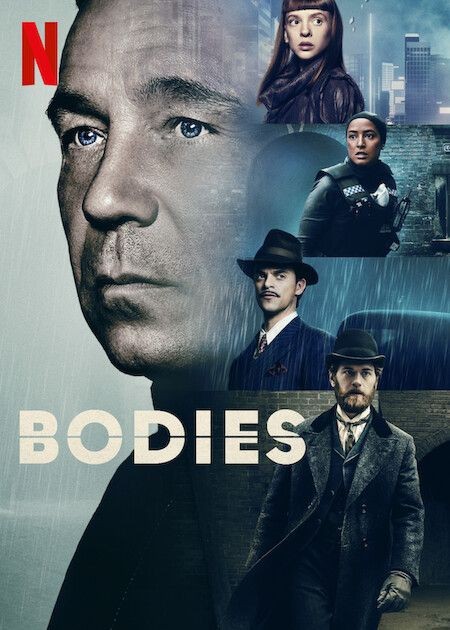
8. Nolly
With Davies' usual style, it is a festive, benevolent, and emotional vindication of his figure, with Bonham Carter absolutely spectacular in her performance.

7. One Piece
Much was feared about the adaptation of the most popular manga of all time, but One Piece, on Netflix, has conquered both fans and critics, and has also become one of the biggest audience phenomenons of the year.
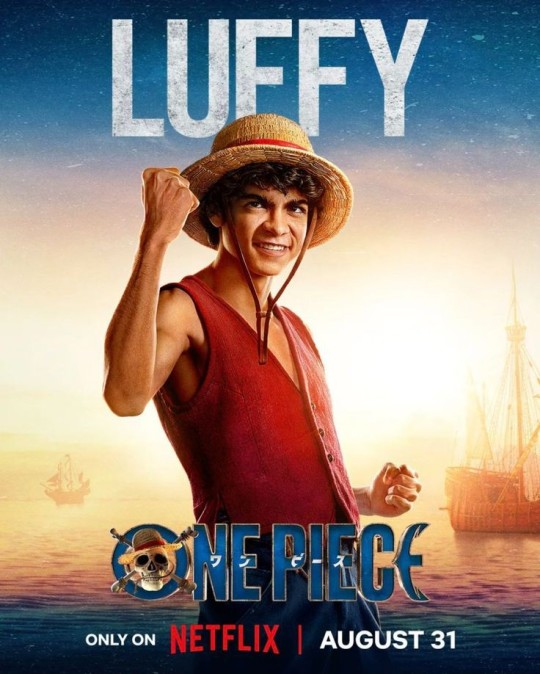
6. Gen V
A great and enjoyable expansion of Ennis and Robertson's despicable heroes universe... this time with a college and dark twist. The spin-off of 'The Boys' delivers exactly what it promises. And what is promised and delivered is exactly what we want.
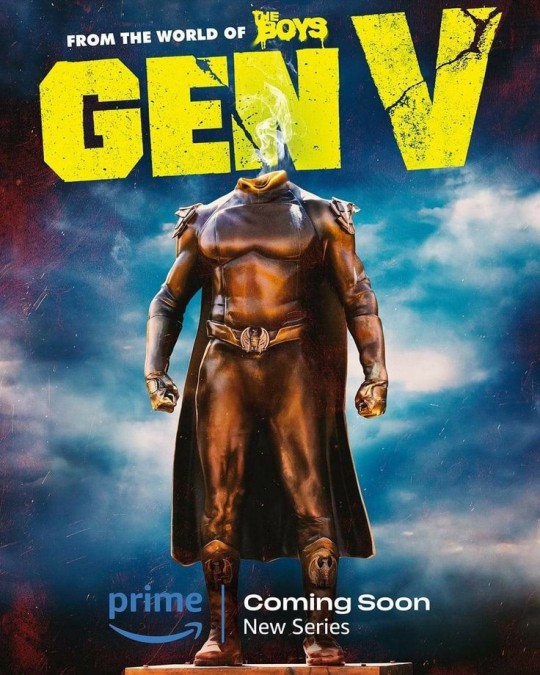
5. Mrs. Davis
If someone had told me before its premiere that this crazy series would be among the best of what has been released this year, I wouldn't have believed it. And it is precisely that campy factor that makes us enjoy jumping from one crazy twist to another, exploring inevitability.
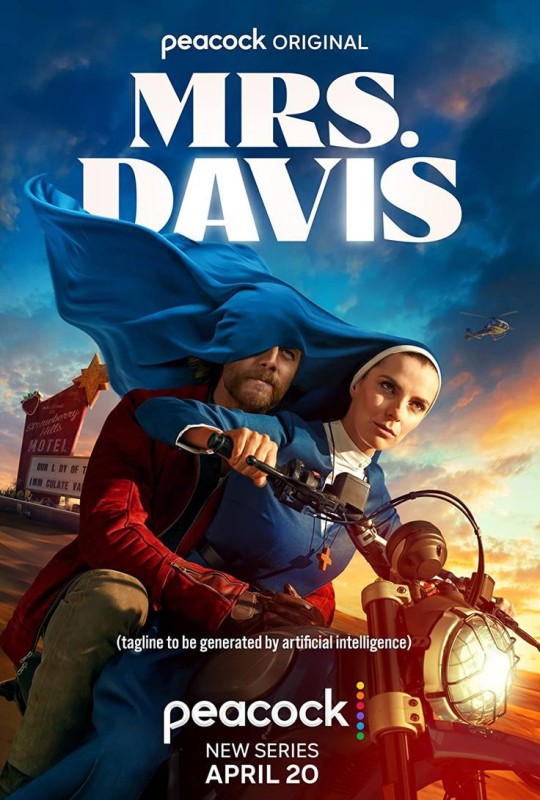
4. Blue Lights
Undoubtedly, this is one of the best police series of recent years. An exploration of the streets of Belfast that fantastically handles the intensity in building danger moments in the lives of these recruitments in the probation period.
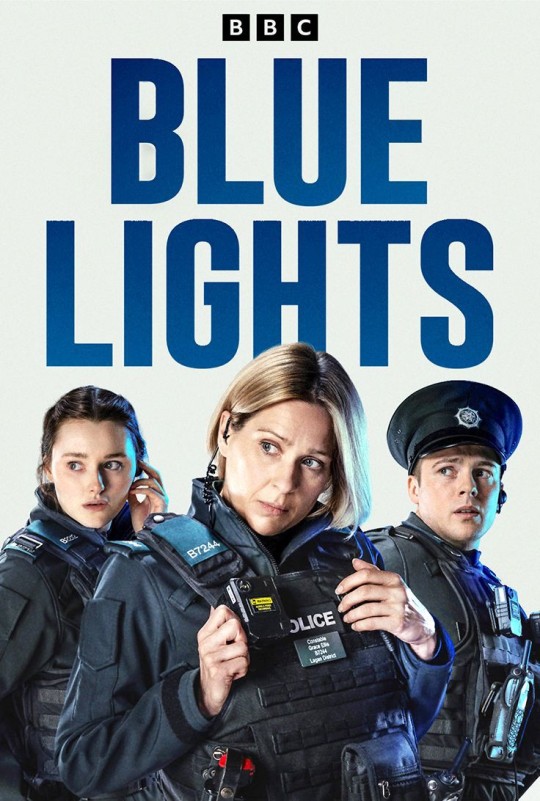
3. 30 Monedas (30 Coins)
The series sponsored by HBO Max is a crazed role-playing game where anything can happen. There are no limits to imagination or narrative constraints; plot twists prevail, surprises abound, and delirium ensues in pursuit of entertainment. Along the way, inevitably, a large number of enemies must be eliminated to reach the final villain, including unpredictable monsters and creatures. The whole package also includes extraterrestrial technology in a mind-boggling climax that sets the bar very high for the continuation of the tribulations of the brave Father Vergara and the troubled inhabitants of Pedraza.
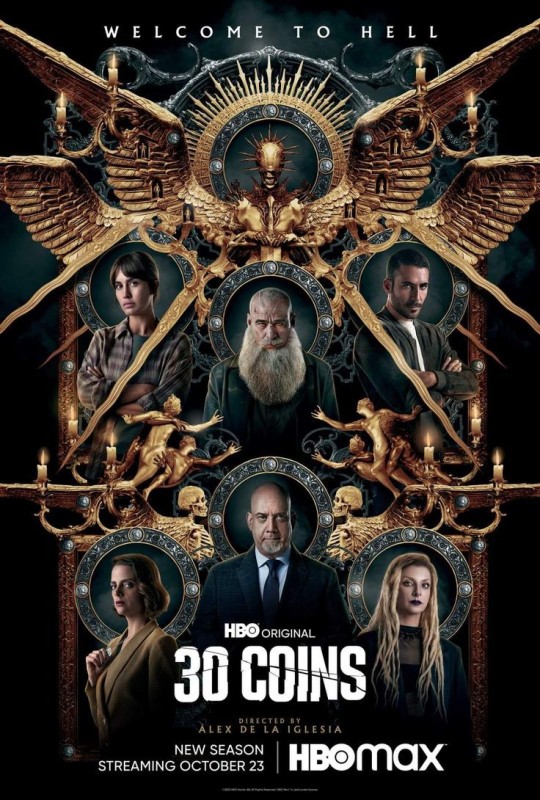
2. Succession
The most remarkable thing about Succession is that, although the children are almost as detestable as the father, each viewer has their favorite: the characters have such complex psychological depth that the series manages to make the progress of any of them be celebrated as if it were a football match. And that's why the definition in the last episode was a masterstroke that left no one indifferent.
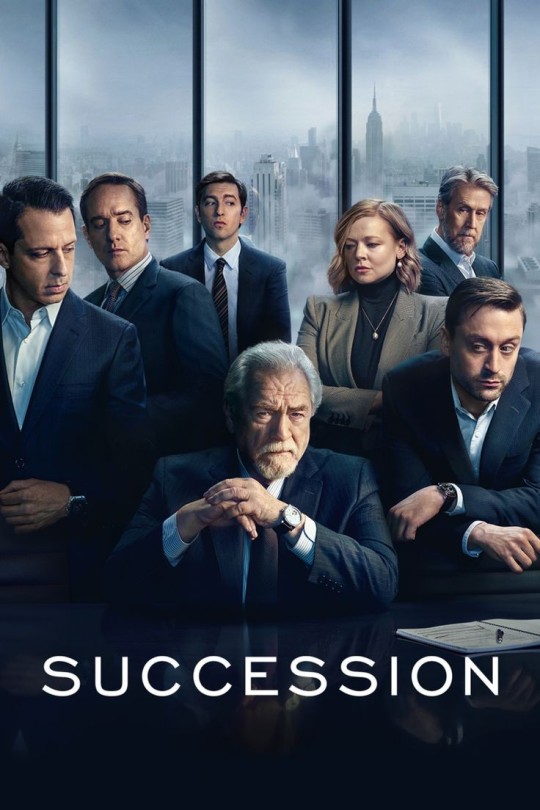
1. The Last of Us
The worldwide phenomenon of 2023 is the excellent adaptation of the video game of the same name. Although it is inevitable to think of other post-apocalyptic television dramas like 'The Walking Dead', with which it shares certain themes, the journey of Joel and Ellie is absolutely awe-inspiring.
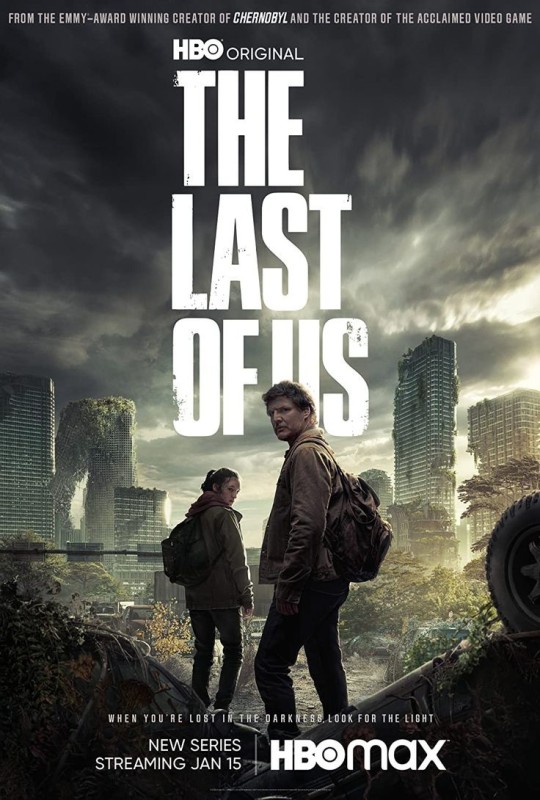
#reviews#2023 reviews#tv series#my top series#the last of us#succession#30 coins#mrs davis#blue lights#gen v#once piece#nolly#bodies#platonic
7 notes
·
View notes
Text
All we know so far about the new Doctor Strange series
It’s been a while since the new volume was announced but now we have the full solicitation and more covers for issue #1.

Written by Jed MacKay and drawn by Pasqual Ferry, the story will be “centered around a shocking mystery that strikes at the very heart of Strange’s legacy and purpose”. The series will pay homage to the “hero’s psychedelic and otherworldly storytelling, taking readers to places only Strange would dare to go and introducing enemies only he could hope to defeat, including a brand-new threat that Strange shares a personal connection with.”
The new uniform was redesigned by Alex Ross himself.

He also did the art for the main cover to promote the series, which is a homage to Frank Brunner’s cover for the Treasure Edition, as well as this pin-up.

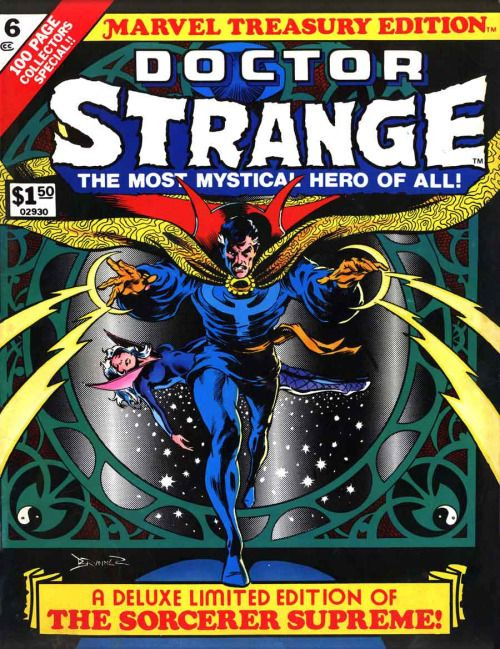
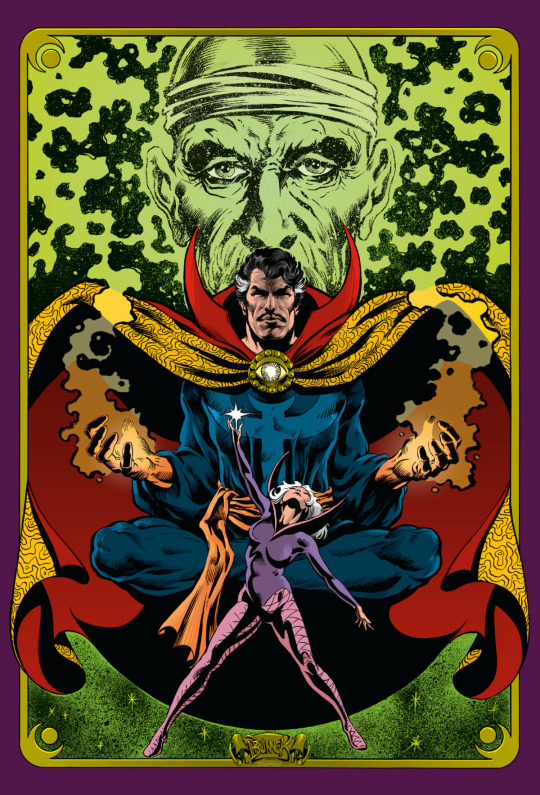
“It's been really exciting to have the opportunity to not only continue exploring the magical side of the Marvel Universe with the inhabitants of 177A Bleecker Street, but to follow the lives of the Stranges as the last year and a half has put them through the wringer. Pasqual has been putting together a truly magical book, and I'm super psyched to show people what's in store for Stephen and Clea Strange—and of course, we won't be giving them any time off after recent events..." MacKay says.
“When I started working for Marvel a long time ago, there were three comics I had always wanted to draw: FANTASTIC FOUR, SPIDER-MAN, and DOCTOR STRANGE,” Ferry said. “Why Doctor Strange? Because his stories include all the elements I love as an artist—the fantasy, science fiction, and imagination. Above all, the fact that I could look at Steve Ditko’s work as a reference really motivates me! When he drew Doctor Strange, all the utopian and imaginary sceneries were incredible. So this is a very special moment in my career, and I’m looking forward to seeing where the character is going to take us with this new narrative. I know a lot of artists, including myself, consider Doctor Strange a challenge, like there is a need to add something new to the character because it offers you that possibility. For me, Doctor Strange is a big challenge, but I embrace it.”
[Source]
Doctor Strange #1
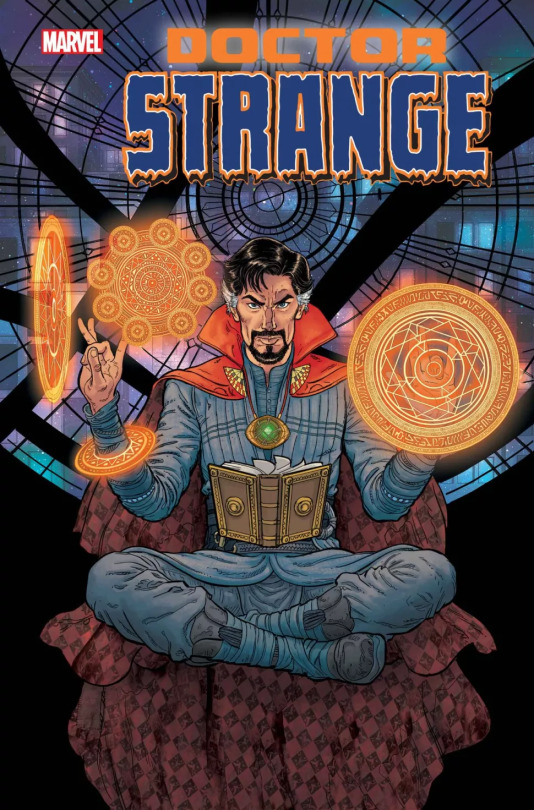
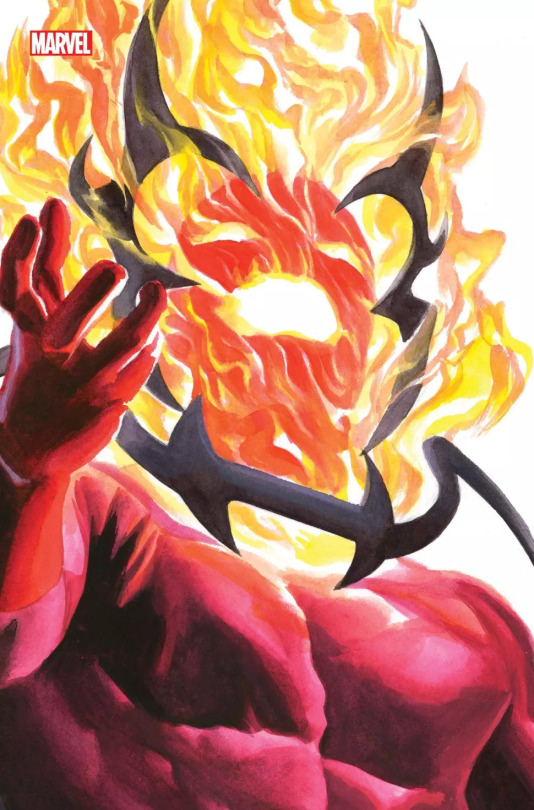
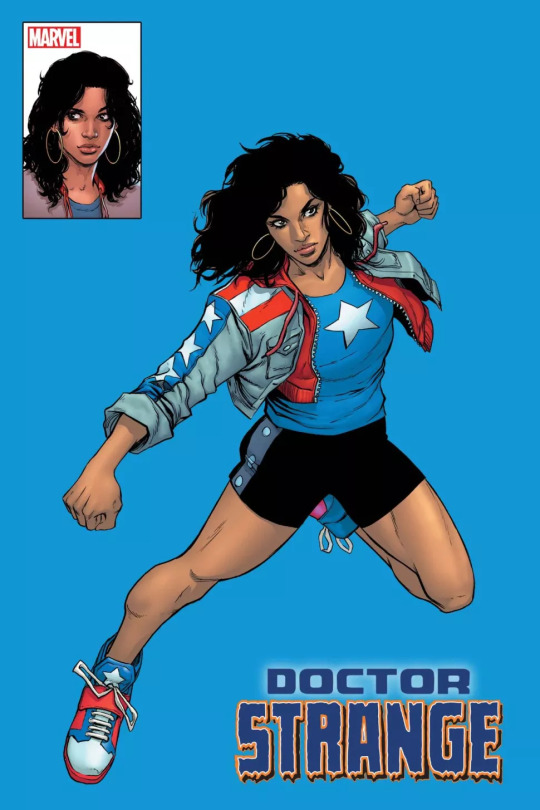
JED MACKAY (W) • PASQUAL FERRY (A) • Cover by ALEX ROSS
MARVEL ICON VARIANT COVER BY STEFANO CASELLI
VARIANT COVER BY MARCO CHECCHETTO
STORMBREAKERS VARIANT COVER BY MARTIN COCCOLO
INFINITY SAGA PHASE 3 VARIANT COVER BY STEVE SKROCE
TIMELESS DORMAMMU VIRGIN VARIANT COVER BY ALEX ROSS
TIMELESS DORMAMMU VIRGIN SKETCH VARIANT COVER BY ALEX ROSS
CHANGE YOUR REALITY!
Stephen Strange is back! Reunited with Clea and Wong, it's back to business as usual for the Sorcerer Supreme. Have your children fallen into a deep nightmarish slumber? Are demonic refugees invading your home? Is your husband possessed by a satanic entity? Then call Doctor Strange! Join Jed MacKay (MOON KNIGHT, BLACK CAT) and Pasqual Ferry (NAMOR: CONQUERED SHORES, SPIDER-MAN: SPIDER'S SHADOW, THOR) as they begin a new chapter in the life of the Master of the Mystic Arts!
40 PGS./Rated T+ …$4.99
---
Now, my personal view. It’s Jed MacKay, so of course I know it’ll be good. Stephen and Clea are in good hands for SURE. It does feel, though, that the series will be focused on classic comics’ style, from Ditko to Brunner. Now, I do love Brunner’s art, it’s one of my favorite DS artists. But I’m not entirely convinced by the new design, especially for modern days. I’m not too familiar with Ferry’s art either, but as always, I’ll wait and see how it goes.
As for the story, am I concerned about who’s the person close to Stephen doing questionable things? Yes. I don’t have any idea of who they might be, though, but I do hope it doesn’t ruin the affection I have towards these characters.
Overall, I’m just glad that Stephen is back and he's reunited with Clea, Wong and Bats. Now I can expect way more cameos and team-ups, which makes me waaaay happier n.n it was a tough year for fans. I really love hurt/comfort, but boi, the comfort part is taking too long!!
PS: I see these MCU/MoM references and I despise them.
#doctor strange#stephen strange#clea strange#wong#dormammu#america chavez#jed mackay#pasqual ferry#alex ross#frank brunner#marvel comics
53 notes
·
View notes
Text
Reading Throne of Glass (10-12)
Disclaimer
Nitpicky but that's just how I enjoy most media. I'm still giving the story a fair chance. Except the racist Nehemia plotline.
Chapter 10
Red marble, its white veins illuminated in the light of the sun, which slowly vanished as the opaque glass doors groaned shut. Chandeliers and torches hung all around. Her eyes darted from one side of the large, crowded chamber to the next. There were no windows, just a wall of glass looking out into nothing but sky. No escape, save for the door behind her.
To her left, a fireplace occupied most of the wall, (...) It was monstrous, shaped like a roaring, fanged mouth, a blazing fire burning within. There was something greenish about the flame, something that made her spine straighten.
Ate up UtM in two paragraphs, that's crazy.
Also the green light is definitely something magic right? Celaena seeing it from outside the castle also now has me convinced the fucking castle is seethrough and I hate it.
Celaena every time she sees Chaol: there he is, I could kill him right now if I really wanted to
Celaena every time she sees Dorian: somehow he's gotten more beautiful. His outfit is on point. His hair is perfect.
Okay the king is evil but he's also up by like, a thousand points? Conquered the continent in less than 20 years, banned magic and then literally got rid of it, lives in a glass castle and has the sword Nothung??? Who's doing it like him? Nobody.
Nothung or Notung, also called Gram or Balmung, is a magical sword from Norse Mythology. It is often depicted with a dragon on it - including here in tog. It is used to slay the dragon, Fafnir. In Adventure Time, it belongs to the legendary hero, Billy.
Celaena is the only woman in the competition. Boring but unsurprising. She's in a fancy dress so most people don't even realise she's one of the competitors.
Instead of immediately thinking to use them underestimating her to her advantage, she's insulted that no one takes note of her. This is the opposite of smart and cohesive character writing. The assassin wants to be the centre of attention. Sure, Jan.
Also, I don't think sjm quite understands the concepts of king's champion and assassin.
The king's champion is a public figure who is basically recognised as having the authority of the king. They would usually be a lord, a knight or a warrior priest - they have to be a great swordsman as they will essentially fight on the king's behalf.
An assassin is usually a non-combatant. They don't engage in much hand to hand or sword fighting. They often kill in non-violent ways. In the case they have a well known alias or persona it's a bogeyman tactic - it's to instill the fear in the target and trust in the client of an inescapable, almost unpredictable death.
Even if people know the name Celaena Sardothien, they shouldn't know what she looks like or where she is.
A flicker of shame sparked within her. What was “Champion” but a dressed-up name for murderer? That's literally what you do tho? That's what we've been made sure to know you take pride in being the best at??
The moderately handsome competitor will get a name, a story and maybe become an ally. The big scary man will be the evil villain. I would say it's childish but SJM still writes characters this way as a grown woman
SJM has a problem with removing the tension from her own narrative. The premise of this book is that Celaena competes in a deadly competition against ruthless murderers and all the while the evil king is lurking. So why drag out the competition to last 13 weeks????
The same was true for Amarantha giving Feyre a month between each trial. It makes the villains look not only less threatening but down right stupid to house, feed AND TRAIN their own enemies?????
If the king was smart he'd pick out 3 psychopaths in his own army and put them in charge of creating a death squad. They'd be more ruthless and more loyal than some criminal picked by one of your overly ambitious subjects.
Is it just me? Is my brain too evil? Is the answer not obvious?
This scene - the king addressing his courtiers and their handpicked champions - does a good job of showing how (besides the point I just brought up) serious and stern and scary the king is. Everyone from murderers to his own nobles flinches and cowers.
Everyone except Dorian. This scene does an even better job at setting up how smart Dorian is. He waits until he knows his father is about 90% through then interrupts and sees himself out. It's a dangerous but brilliant play.
All at once Dorian is reminding all his father's ambitious courtiers that he is above them - he can do what they cannot.
And through the same action he's actually reinforcing his father's favour: the king is reminded Dorian isn't a coward or a follower, he has the iron and will to go against the raging current - he is the only one who could take up the throne and not be crushed by it.
Very well done.
Then outside, he's instantly back to cheerful and snarky. Love him.
Back to them being stupid. Why wait until now to pull out the alias??? Celaena was bailed out, travelled for weeks, came to the castle and even signed on a piece of paper using the name CELAENA SARDOTHIEN.
“To everyone in this castle,” Dorian said, “your name is Lillian Gordaina. Your mother is dead and your father is a wealthy merchant from Bellhaven. You are the sole heir to his fortune. However, you have a dark secret: you spend your nights as a jewel thief. I met you this summer after you tried to rob me while I was vacationing in Bellhaven, and I saw your potential then. But your father discovered your nightly fun, and removed you from the lure of the city to a town near Endovier. When my father decided to have this competition, I journeyed to find you, and brought you here as my Champion. You can fill in the gaps yourself.”
Celaena's third identity has a more fleshed out backstory than Feyre Archeron
She raised her brows. “Really? A jewel thief?” idk if sjm thinks she's funny for pointing out the nonsense in her own plot or what. Cause I'm not gonna brush past this just cause it's brought up in the book. Why the fuck would a jewel thief be in the competition to become king's champion?? That's somehow worse than assassin
Kaltain!!! She would have ended Ianthe and Mor and Amren. I wanna see her and Nesta go back and forth, a verbal duel please. On a good day - a day when sjm is consistent - I don't think she could take Elain.
...I do hope we’ll see more of each other, Lady Lillian,” she said, watching her with a keenness that would make any assassin proud. “We must be friends, you and I.”
Kaltain is already soooo interesting. Her, Lucien and Nesta need to have a passive aggressive dinner.
She glared. “I hate women like that. They’re so desperate for the attention of men that they’d willingly betray and harm members of their own sex. And we claim men cannot think with their brains! At least men are direct about it.”
When you hate pickme's so much you horseshoe around back to also being a misogynistic pickme. Also you're describing a certain someone who puts a man and other men above her own sisters it's crazy
So glad that Celaena, who is actually a monarch, and Chaol, who is a lord from a slaver kingdom, bonded over how Kaltain is evil for being a rich girl with servants
You'll get training...but the competition begins tomorrow? No one knows how things naturally progress??
Chapter 11
She didn’t care that she had only a few months to beat the other Champions—she needed sleep. see, you killed the sense of urgency for the characters and the readers
Again, the king is training and arming the criminals in his own home. This could not be stupider.
I can forgive the dumb shit Celaena does like complaining about clothes because her thoughts make it obvious she is a little scared and worried about the competition.
Cain walks up to her to chat shit, she gets mad and thinks it would have been easy to grab his neck and slam his head into the floor. He's huge, I don't think that would have been easy at all actually.
Celaena and Chaol's sword practice is pretty good. I like that Chaol was the one to catch her off guard with a trick.
Don't get why the competitors train within view of each other though, knowledge is the first weapon of war.
Chaol is up 10 points, I like him. I'm pretty biased because this training scene made me think of Cassian and Feyre and what I could have had
Chapter 12
Theodus Brullo. Weapons Master of 30 years, trained Chaol. Characters like these just existing show how lazy sjm is in acotar.
At least 6 of the competitors were kicked out of the King's army. Why are they alive? Make them a squad or kill them.
Nox Owen. Moderately handsome guy that's been smiling at Celaena.
...and then there were the two shackled murderers.
As his name suggested, Bill Chastain, the Eye Eater, ate the eyes of his victims. He looked surprisingly plain, with mousy brown hair, tan skin, and average height, though Celaena had trouble not staring at his scar-flecked mouth. The other murderer was Ned Clement, who’d gone for three years under the name Scythe, for the weapon he’d used to torture and hack apart temple priestesses. It was a wonder they hadn’t executed either man, though from their tanned skin, she guessed they’d spent the years since their captures toiling under the sun in Calaculla, the southern sister labor camp to Endovier.
In acotar the prison is called the Prison and the guy who carves with bone is called the Bone Carver
They weren’t even in the Assassins Guild—not that Arobynn Hamel would ever allow them in. Membership required years of training and a more-than-impressive track record. While these four might be skilled, they lacked the refinement that Arobynn favored in his followers. She’d have to keep an eye on them, but at least they weren’t the Silent Assassins from the windswept dunes of the Red Desert.
I wanna read about them, I hope Arobynn is as cool as he's building up to be. That means not falling for stupid shit, it better be actually difficult to take him down
Brullo is making the competitors do a fitness run. I'd fail immediately. Send me home
“If I have to call myself a jewel thief again—”
Chaol raised his brows. “You’ll do what, exactly?”
“Do you know how insulting it is to pretend to be some nobody thief from a small city in Fenharrow?”
He stared her down, quiet for a moment. “Are you that arrogant?” She bristled, but he went on. “It was foolish to spar with you just now. I’ll admit that I hadn’t realized you’d be that good. Thankfully, no one noticed. And do you want to know why, Lillian?” He took a step closer, his voice lowering. “Because you’re some pretty little girl. Because you’re a nobody jewel thief from a small city in Fenharrow...
This was wildly attractive, don't ask me why. Chaol is up another 5 points.
His advice to her is smart. Play the middle ground for the long run so no one sees you as an immediate threat or an easy target.
Cain gotta be on magic steroids. I'm calling it rn.
I like that sjm realistically depicts the limits of the human body. The run is doable but it takes a lot out of Celaena and she has to throw up in the woods afterwards while seeing stars. Her years of training is the only thing that got her through it.
It's a shame that sjm didn't continue to get better as an author.
----
Overall still enjoying the read. There's pitfalls and potholes here and there but I can feel sjm putting an effort into this story that has unfortunately become rare these days not just for her but for fantasy romance as a whole. Of course it's also mostly her influence that caused this decline.
I genuinely like these 3 characters soooo much. I peaked ahead and I know Nehemia shows up next chapter so I'm excited to read that tomorrow.
Dorian is my favourite in terms of character potential but I can definitely see why Celaena falls for Chaol.
Celaena herself is really so fleshed out that even her worst traits don't bother me because I can see where they come from. She does a lot of active dissociating from her real feelings by focusing on shallow likes and dislikes in her immediate situation
27 notes
·
View notes
Note
The Saporians kinda remind me of the Equalists from Legend of Korra, based on how the narrative treated them: an organization that started out with complexity, but was turned into a shallow Big Bad—by doing some horrible thing that was not previously part of the plan for no reason —near the end of its arc.
An analysis I read once sums this issue in media up really well: it’s better to start a story out with a simple idea, and gradually develop it more. Otherwise, by starting complex, usually a story will devolve into a flat and sloppy ending as the story needs to be finished.
I might be wrong about the Saporians being complex, as my memories of the show are rusty lol. But I’d like to know what you think, and if there are any other times in TTS that you think fit the idea of a ‘complex idea ending in overly an simple way.’
Holy cow, I've been sitting on this ask since last August. ;o; I'm sorry it took me so long to get around to answering it!
I only watched Korra once, back when it was new, so I don't remember much about how the Equalists operated, other than that they didn't want there to be any benders, or something. I completely agree, that the subplot with the Saporians started out complex and then got turned into "generic Big Bad". Lady Caine got the same treatment. Hell, TBEA implied that she was going to be the overarching recurring villain of the series, and instead she got two returns, both of which landed with her being rearrested.
However, I feel that this is less a case of "a sloppy ending as the story needs to be finished" and more that neither the Saporians nor Lady Caine were ever meant to be the main villain (once the plot was cemented, I can't speak for pre-production). They were the at-home villains Rapunzel had to deal with who weren't completely incompetent while she also had to deal with the bigger issue of Zhan Tiri and Cassandra.
But I felt that both of these groups held some amazing political intrigue, and I think they both would have worked well for a series more geared toward an older audience (who wouldn't be bored with the politics) with a less bombastic plot. When Caine and later the Saporians were introduced as a concept, I thought the series was going to end up being about an attempt to overthrow the crown (which, let's be real, would be difficult to argue with). I thought the two groups were going to team up with Varian in jail, and while we were 2/3 right, leaving Lady Caine out of the mix is almost criminal. She had amazing leadership skills and a cut throat way of handling her enemies that would have made the Saporians nigh unstoppable. (Until internal conflict of who actually got to claim the kingdom down that it was conquered took hold.) I even thought the Saporians would have something to do with Zhan Tiri's release, which would have been far more satisfying, imo.
Anyway, sorry again for the super-late reply.
19 notes
·
View notes